Adapting participatory epidemiology to estimate the incidence of human diseases in Moroto District, Karamoja, Uganda
KRSU Resources
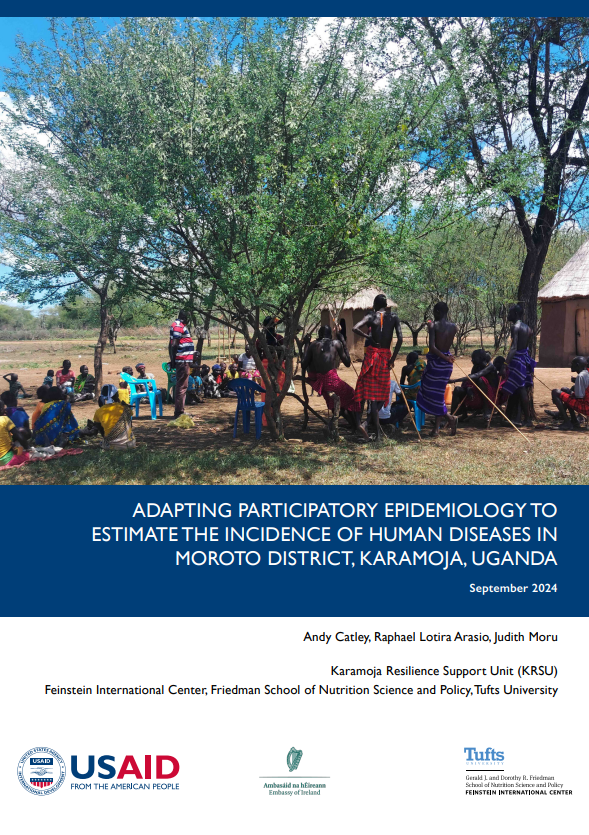
Adapting participatory epidemiology to estimate the incidence of human diseases in Moroto District, Karamoja, Uganda
This study explored the use of participatory epidemiology (PE) to estimate the annual incidences of human diseases in Karamoja, Uganda, with emphasis on diseases associated with water. Adapted PE methods were used successfully to estimate disease incidences in young children and adults, and revealed a rich knowledge on the clinical signs and causes of diseases. The report concludes that PE could be useful for overcoming some of the spatial limitations of the health surveillance system in Karamoja, and the temporal limitations of bi-annual food security and nutrition assessments.
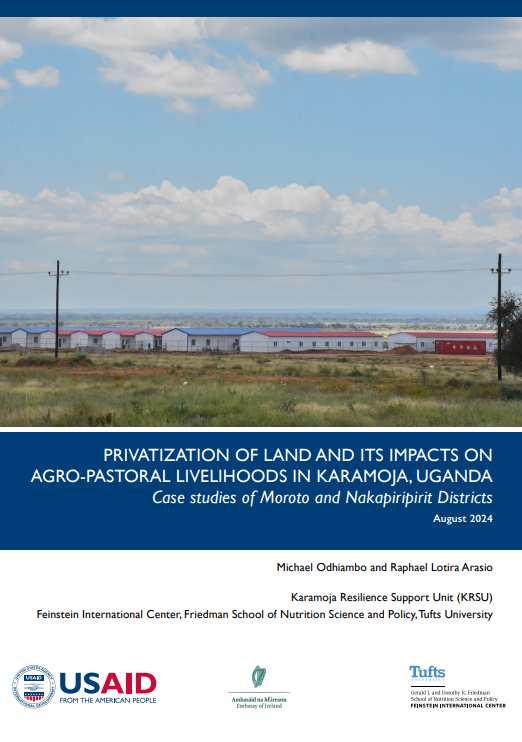
Privatization of Land and its Impacts on Agro-Pastoral Livelihoods in Karamoja, Uganda: Case studies of Moroto and Nakapiripirit Districts
This report presents the findings of a review of land issues in Karamoja, with a particular focus on trends in privatization of communal lands and its impacts on agro-pastoral livelihoods.
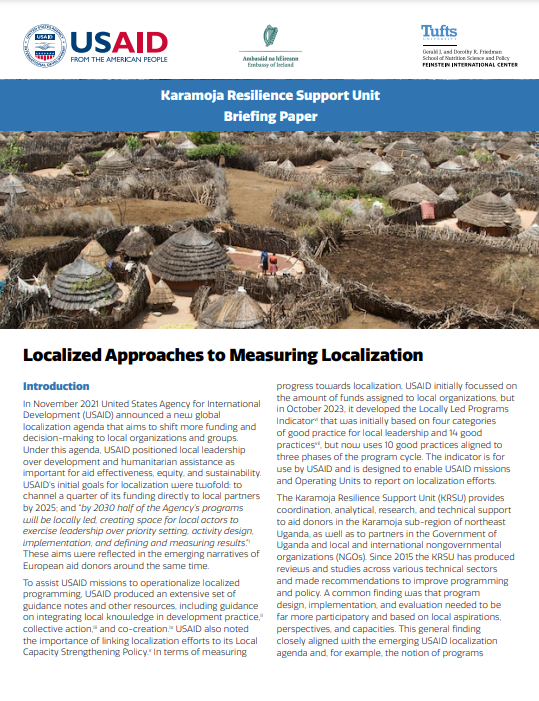
Localized Approaches to Measuring Localization
In November 2021 United States Agency for International Development (USAID) announced a new global localization agenda that aims to shift more funding and decision-making to local organizations and groups. Under this agenda, USAID positioned local leadership over development and humanitarian assistance as important for aid effectiveness, equity, and sustainability.
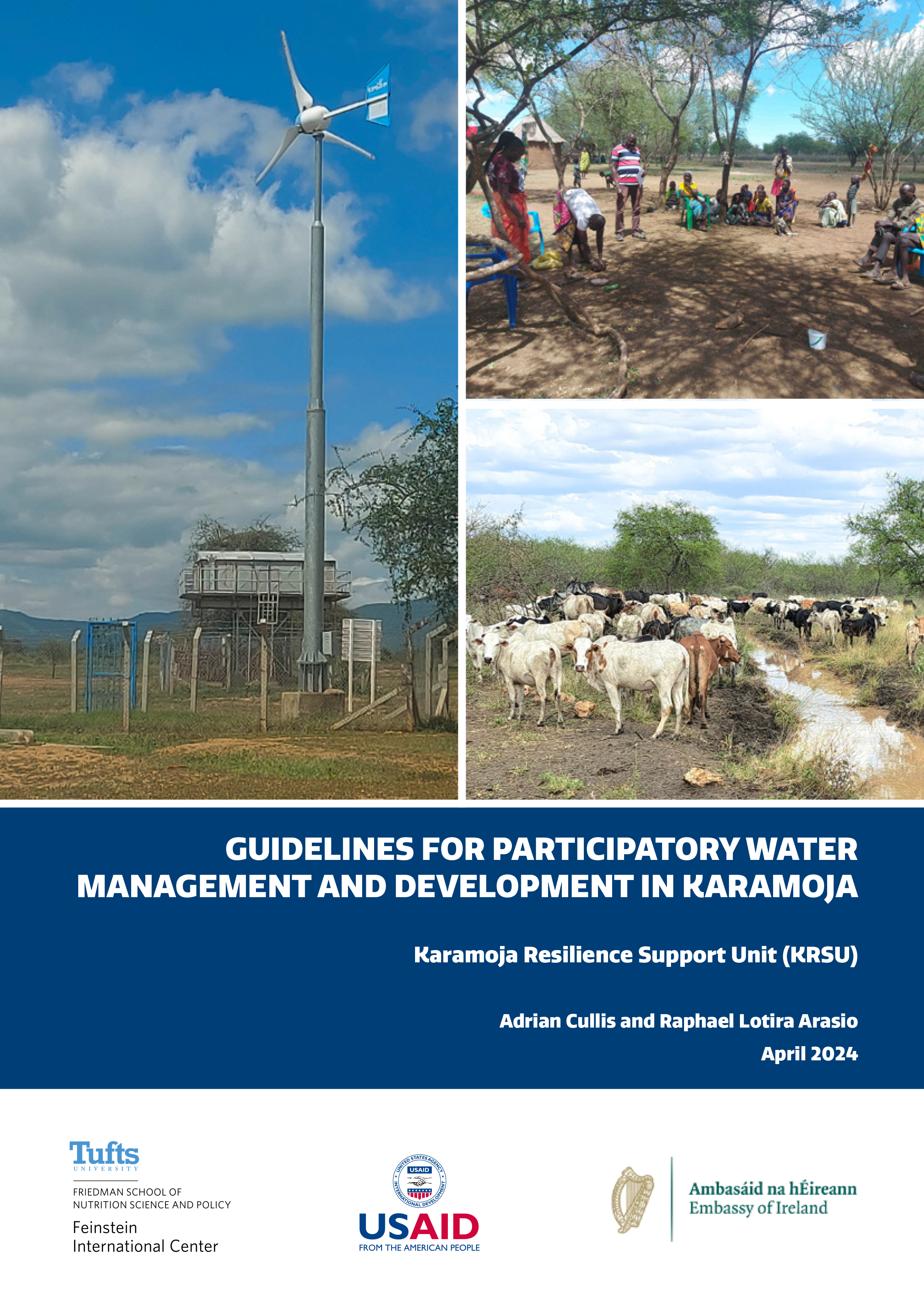
Guidelines for Participatory Water Management and Development in Karamoja
Water resources support key sectors of the economy namely: hydropower generation, agriculture, fisheries, domestic water supply, industry and navigation among others. However, the efficiency and sustainability of water utilization has recently been a concern in Uganda mainly due to inadequate sectoral collaboration in planning and implementation, increasing frequency of floods and droughts, environmental degradation and pollution of water resources.
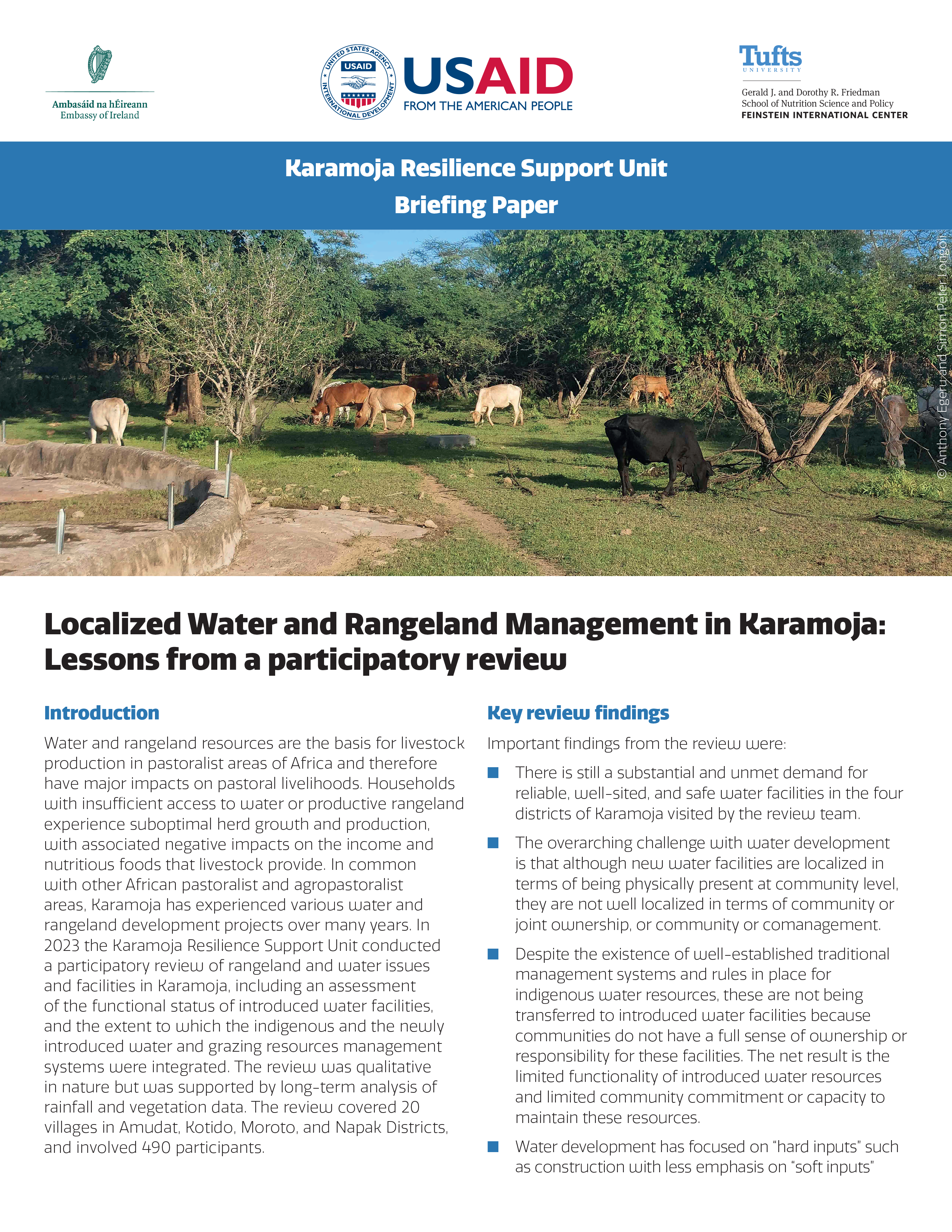
Localized Water and Rangeland Management in Karamoja: Lessons from a participatory review
Water and rangeland resources are the basis for livestock production in pastoralist areas of Africa and therefore have major impacts on pastoral livelihoods. Households with insufficient access to water or productive rangeland experience suboptimal herd growth and production, with associated negative impacts on the income and nutritious foods that livestock provide. In common with other African pastoralist and agropastoralist areas,
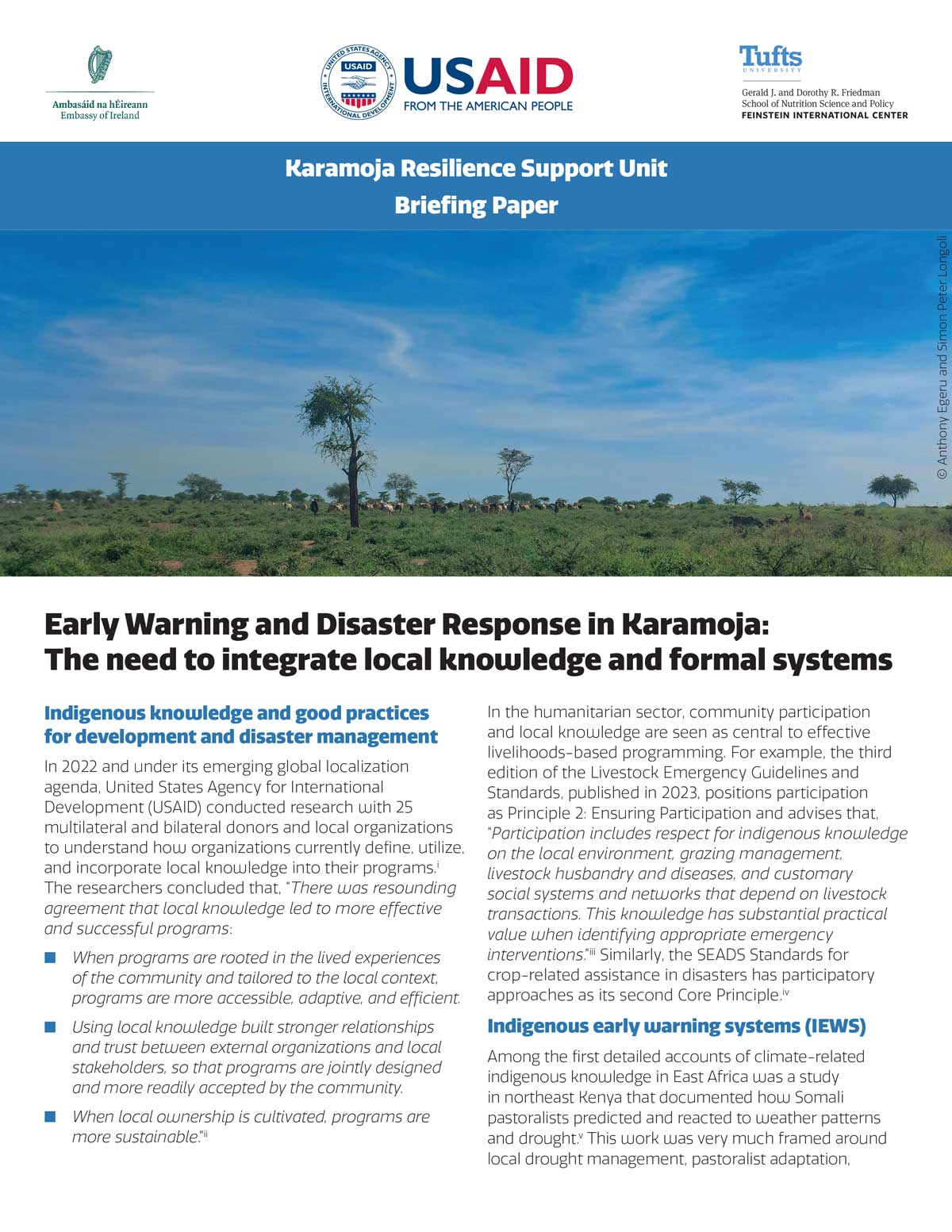
Early Warning and Disaster Response in Karamoja: The need to integrate local knowledge and formal systems
A genuine localized approach to early warning should shift the approach to more of a partnership and coacceptance of the strengths and weaknesses of indigenous and conventional systems.
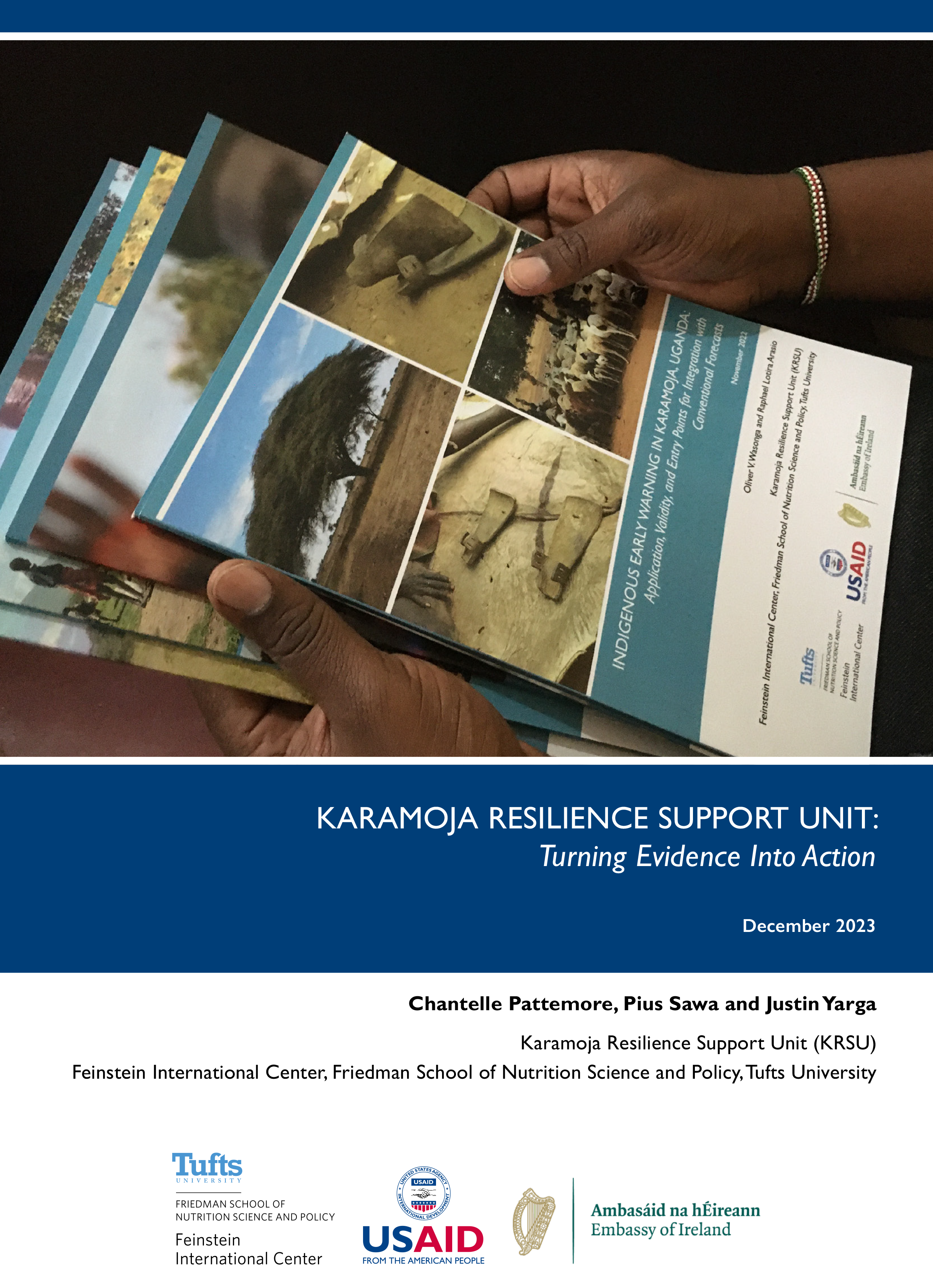
KARAMOJA RESILIENCE SUPPORT UNIT: Turning Evidence Into Action
To gauge understanding of how KRSU’s work benefits and is utilized in Karamoja, a rapid review was conducted in November and December 2023. The review involved face-to-face interviews with a number of the organization’s partners – including non-governmental organizations (NGOs), universities, academics, and donors.
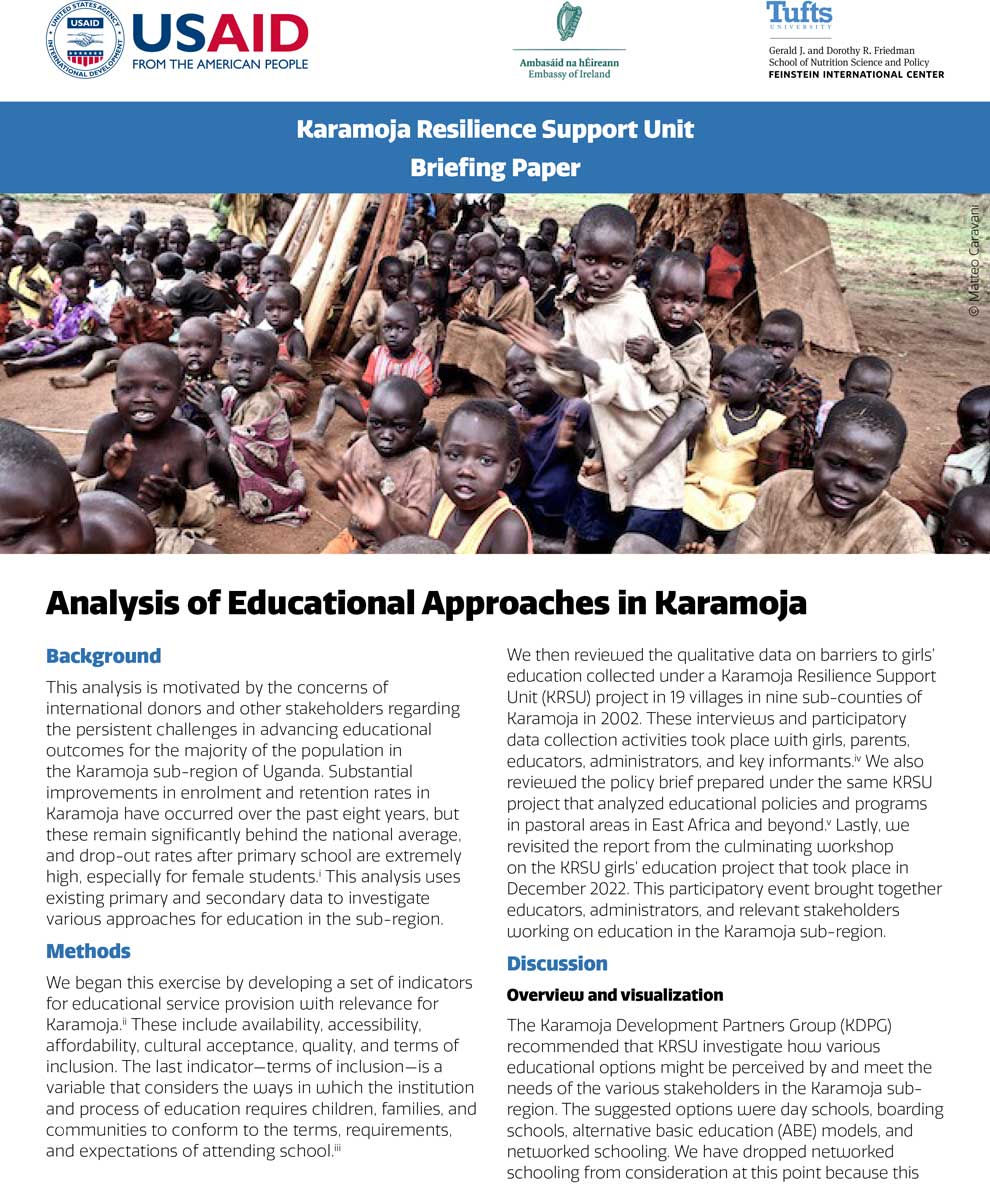
Analysis of Educational Approaches in Karamoja
This analysis is motivated by the concerns of international donors and other stakeholders regarding the persistent challenges in advancing educational outcomes for the majority of the population in the Karamoja sub-region of Uganda. Substantial improvements in enrolment and retention rates in Karamoja have occurred over the past eight years, but these remain significantly behind the national average, and drop-out rates after primary school are extremely high, especially for female students.i This analysis uses existing primary and secondary data to investigate various approaches for education in the sub-region.
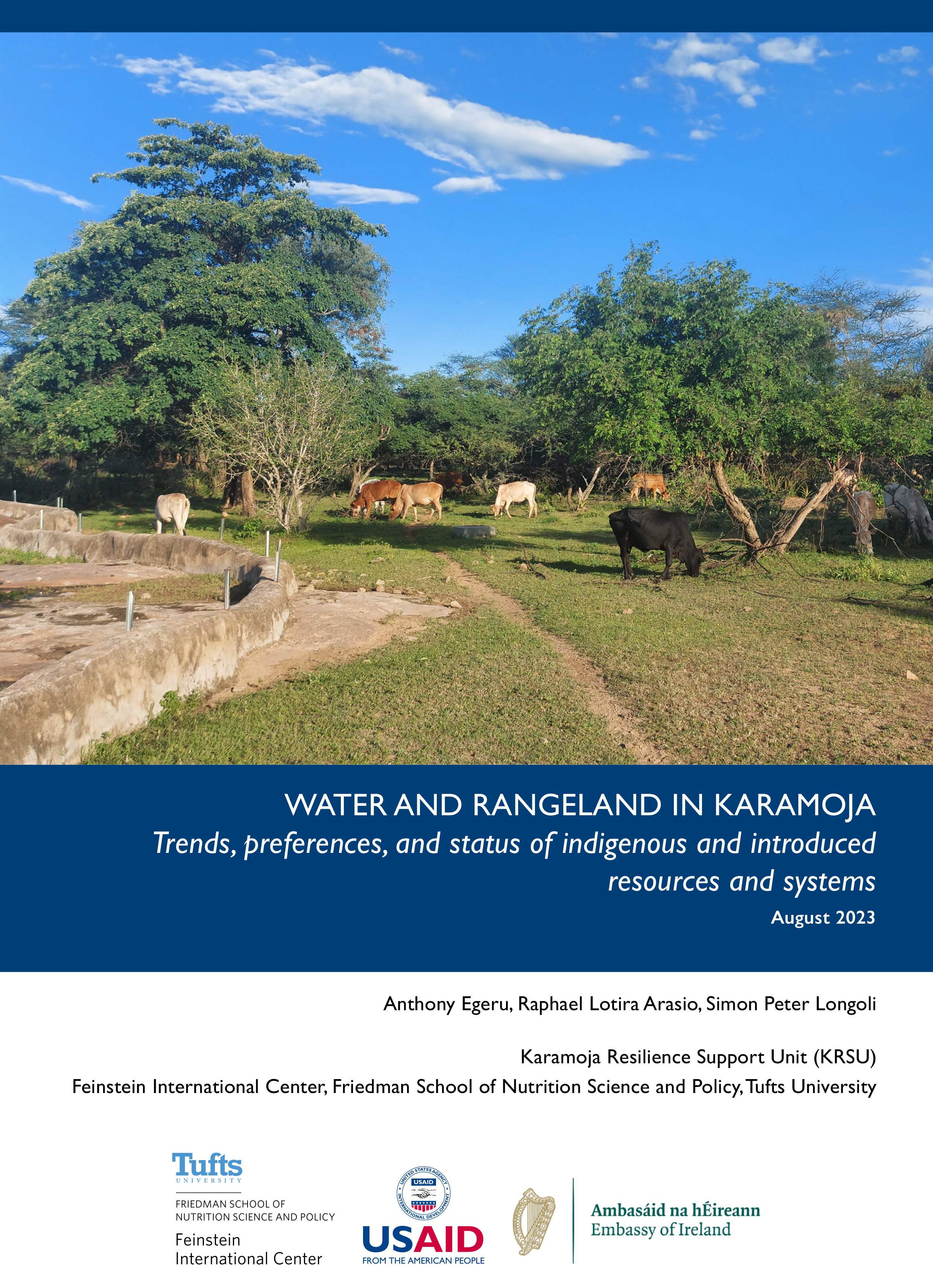
WATER AND RANGELAND IN KARAMOJA
Water and rangeland resources are the basis for livestock production in pastoralist areas of Africa and therefore have major impacts on pastoral livelihoods. Households with insufficient access to water or productive rangeland experience suboptimal herd growth and production, with associated negative impacts on the income and nutritious foods that livestock provide.
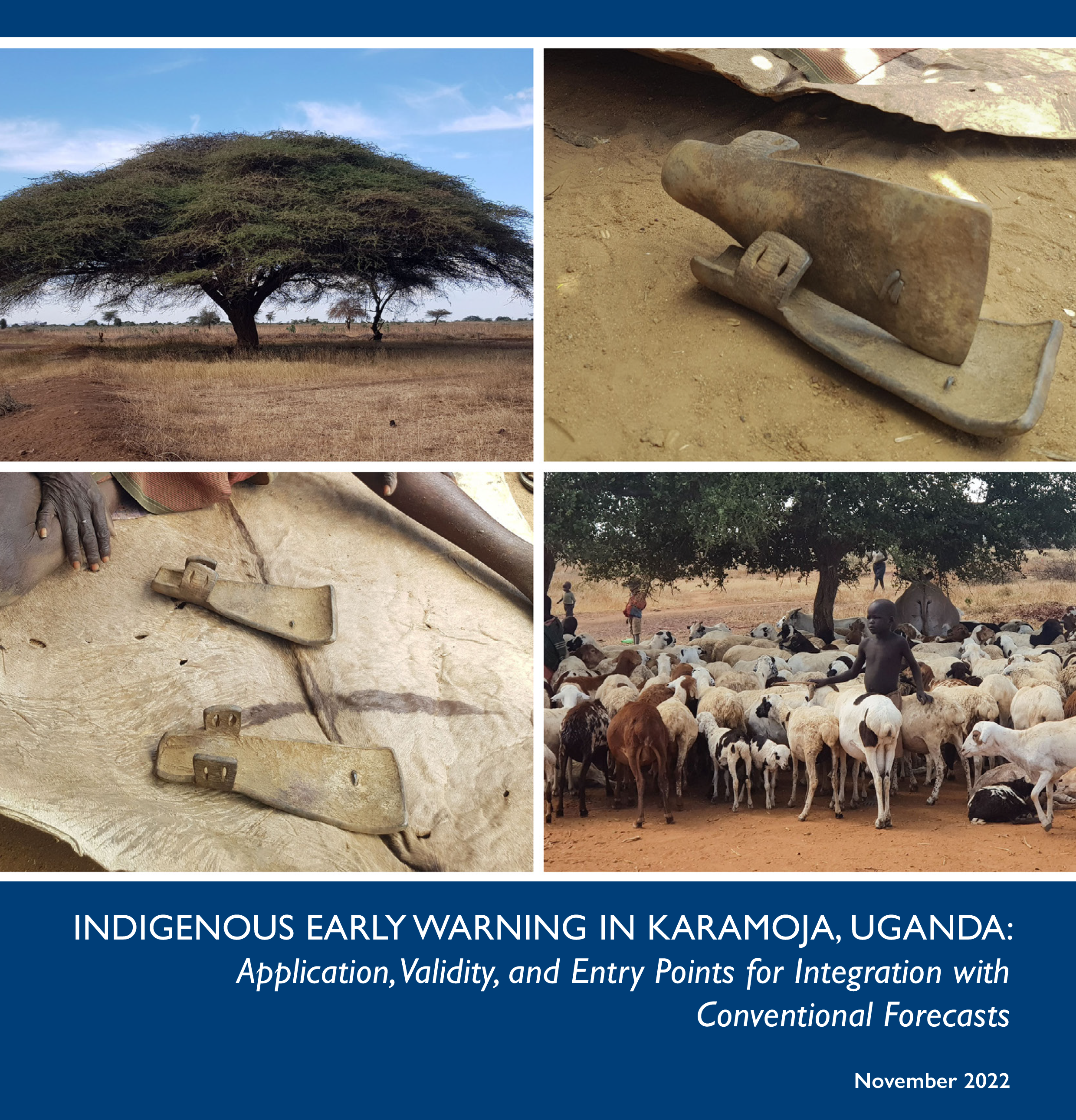
INDIGENOUS EARLY WARNING IN KARAMOJA, UGANDA
An effective early warning system (EWS) is a prerequisite for timely response to avert and mitigate the impacts of disasters that affect pastoralist and agro-pastoralist communities. Whereas there exist various forms of EWS in Uganda, the main concerns have been whether the early warning information is timely, accurate, accessible, and elicits early action. These questions point at inefficiencies in the conventional EWS in the country and the importance of the indigenous early warning system (IEWS) used by rural communities. These indigenous systems are especially important where conventional early warning information is inaccessible or coarse and therefore not suitable for guiding location-specific decisions.
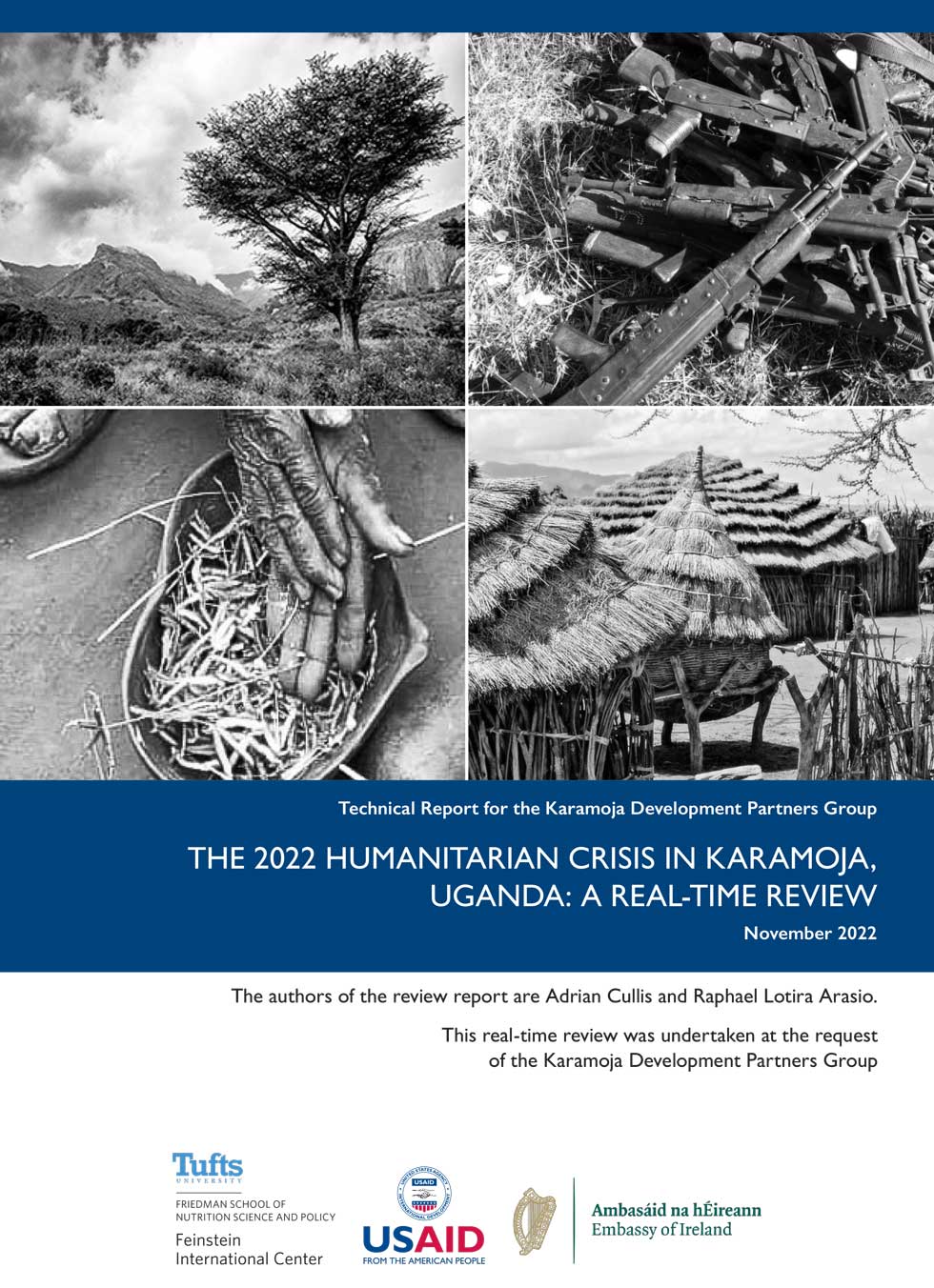
The 2022 Humanitarian Crisis in Karamoja, Uganda: A real-time review
This real-time review aims to document the events that led to Karamoja’s hunger crisis in 2022, the reporting of the worsening situation by early warning systems, and the responses of the Government of Uganda and the international aid community. The review took place from the September 27–October 21, 2022.
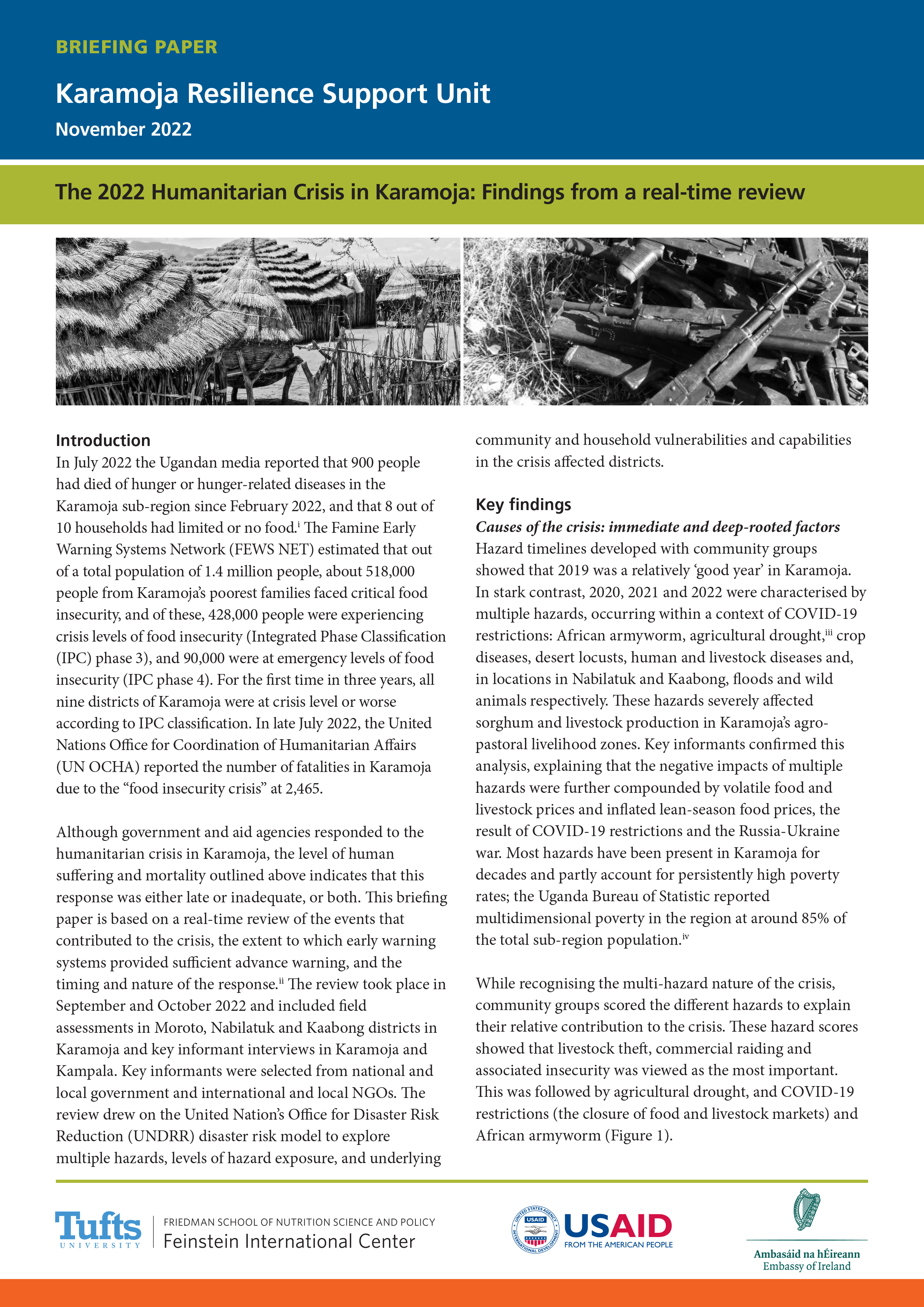
The 2022 Humanitarian Crisis in Karamoja: Findings from a real-time review
In July 2022 the Ugandan media reported that 900 people had died of hunger or hunger-related diseases in the Karamoja sub-region since February 2022, and that 8 out of 10 households had limited or no food.i
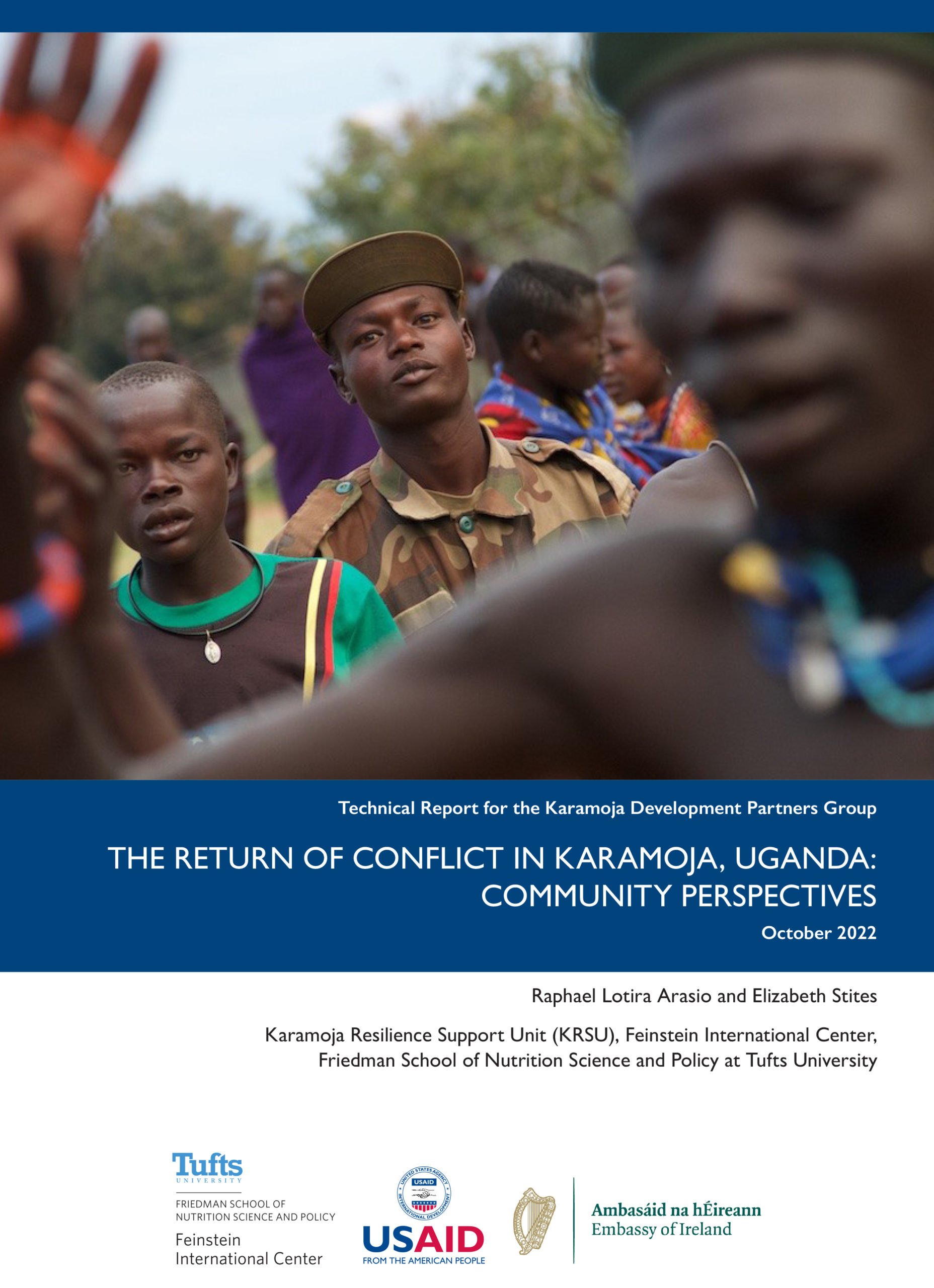
The Return of Conflict in Karamoja, Uganda: Community Perspectives
After nearly 10 years of relative peace, conflict and insecurity returned to the Karamoja sub-region of northeastern Uganda starting in 2019. This assessment investigates this resumption of conflict and insecurity from the perspective of the communities most involved and affected.
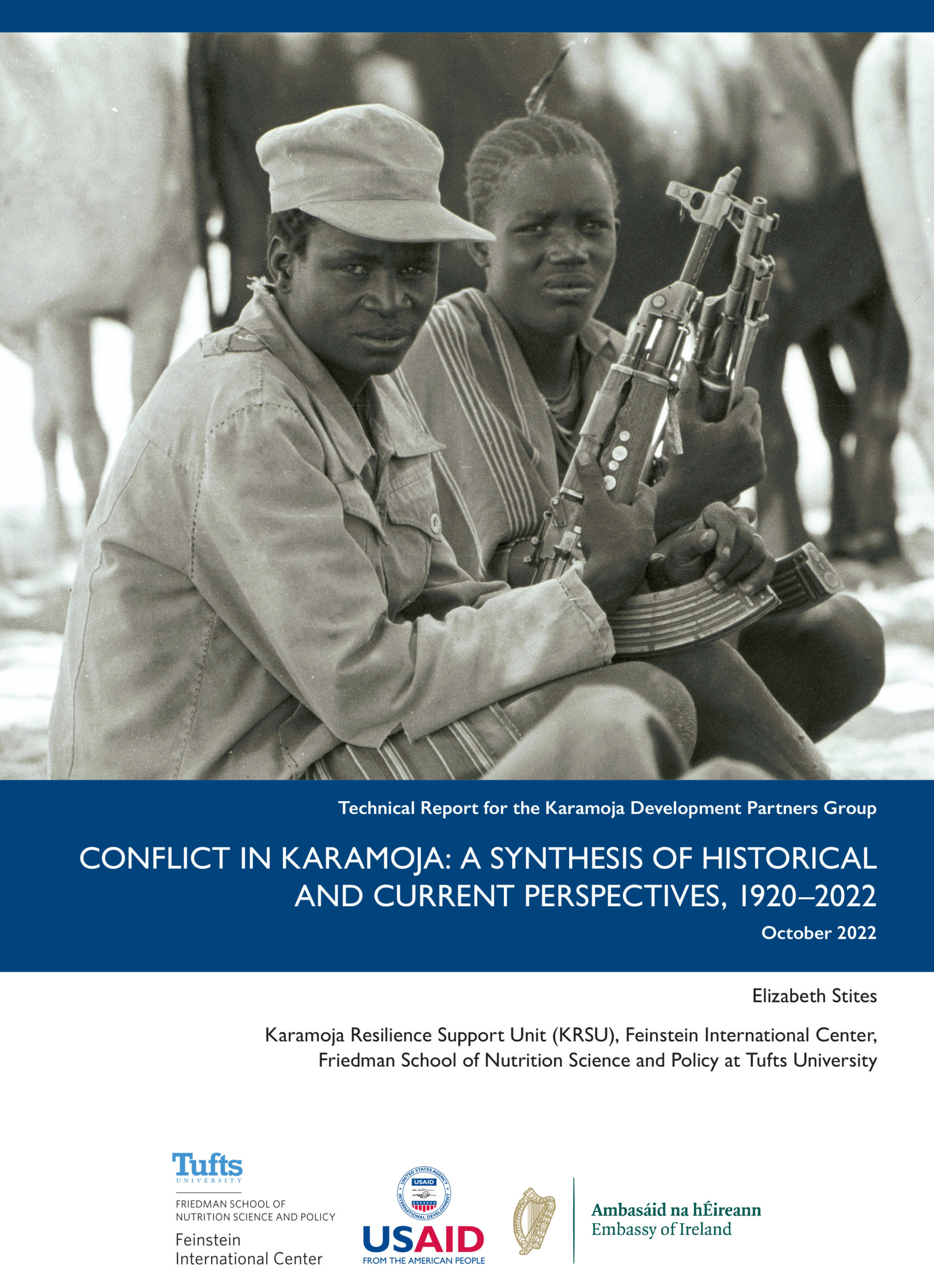
Conflict in Karamoja: A Synthesis of Historical and Current Perspectives, 1920-2022
This knowledge synthesis focuses on violent conflict in the Karamoja sub-region of northeastern Uganda. While violence and conflict both can and do take many forms, this synthesis takes as its focus the phenomenon of cattle raiding and associated violence. This knowledge synthesis briefly describes the concept and role of cattle raiding within pastoral societies in East Africa and the Karamoja Cluster and then examines different historical periods and experiences of violent conflict associated with cattle raiding within the Karamoja sub-region.
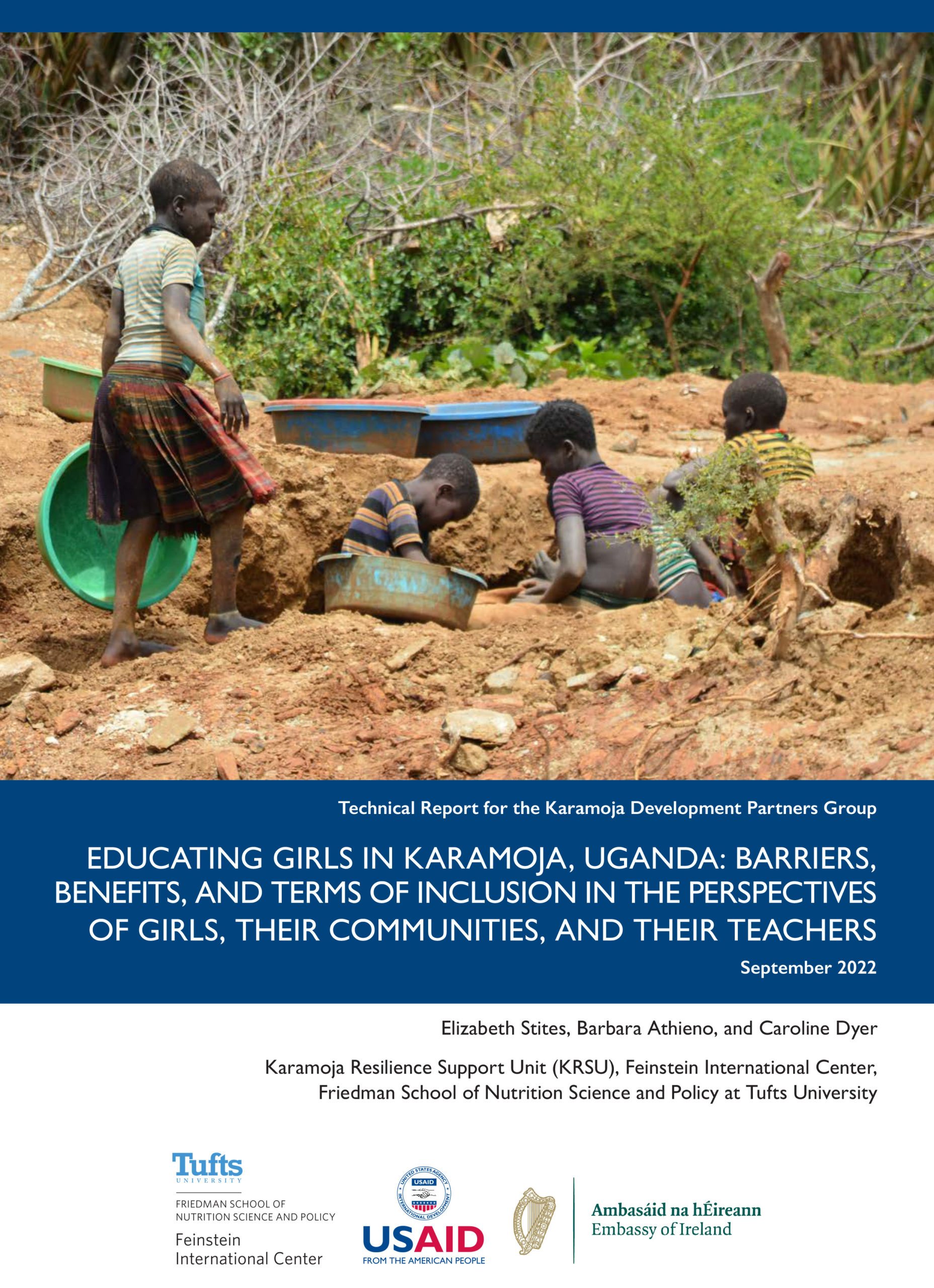
Educating Girls in Karamoja, Uganda: Barriers, Benefits, and Terms of Inclusion in the Perspectives of Girls, their Communities, and their Teachers
This scoping report investigates barriers, benefits, and “terms of inclusion” for girls’ education in the Karamoja sub-region of Uganda. Karamoja has some of the lowest education indicators in the country, with females generally faring much worse than males. The report examines the experiences and perceptions of girls, male and female community members, and teachers about girls’ education in the region, drawing on an assessment that took place from June to August 2022 in 10 sites in four districts: Amudat, Kaabong, Moroto, and Napak.
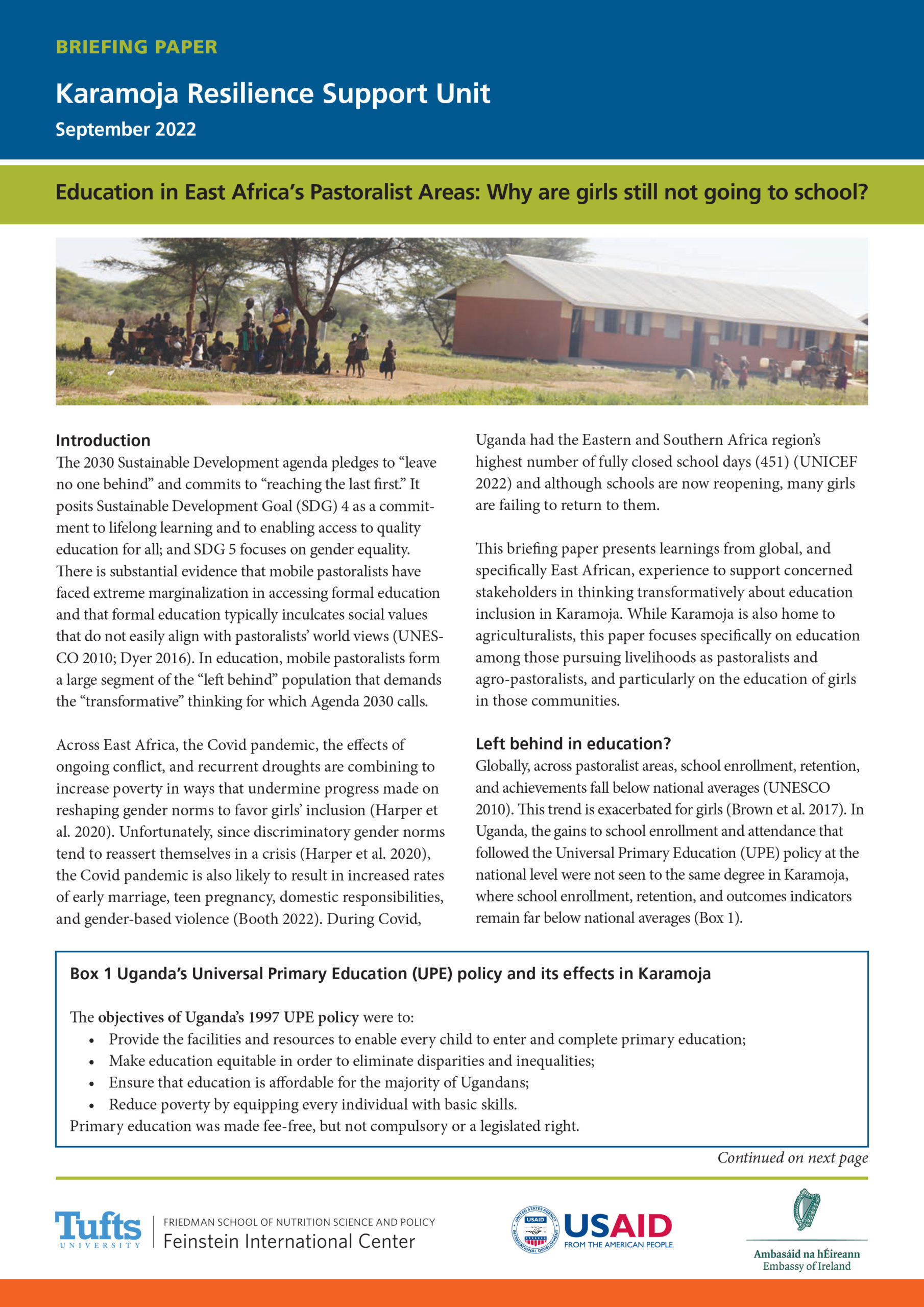
Education in East Africa’s Pastoralist Areas: Why are girls still not going to school?
This briefing paper presents learnings from global, and specifically East African, experience to support concerned stakeholders in thinking transformatively about education inclusion in Karamoja. While Karamoja is also home to agriculturalists, this paper focuses specifically on education among those pursuing livelihoods as pastoralists and agro-pastoralists, and particularly on the education of girls in those communities.
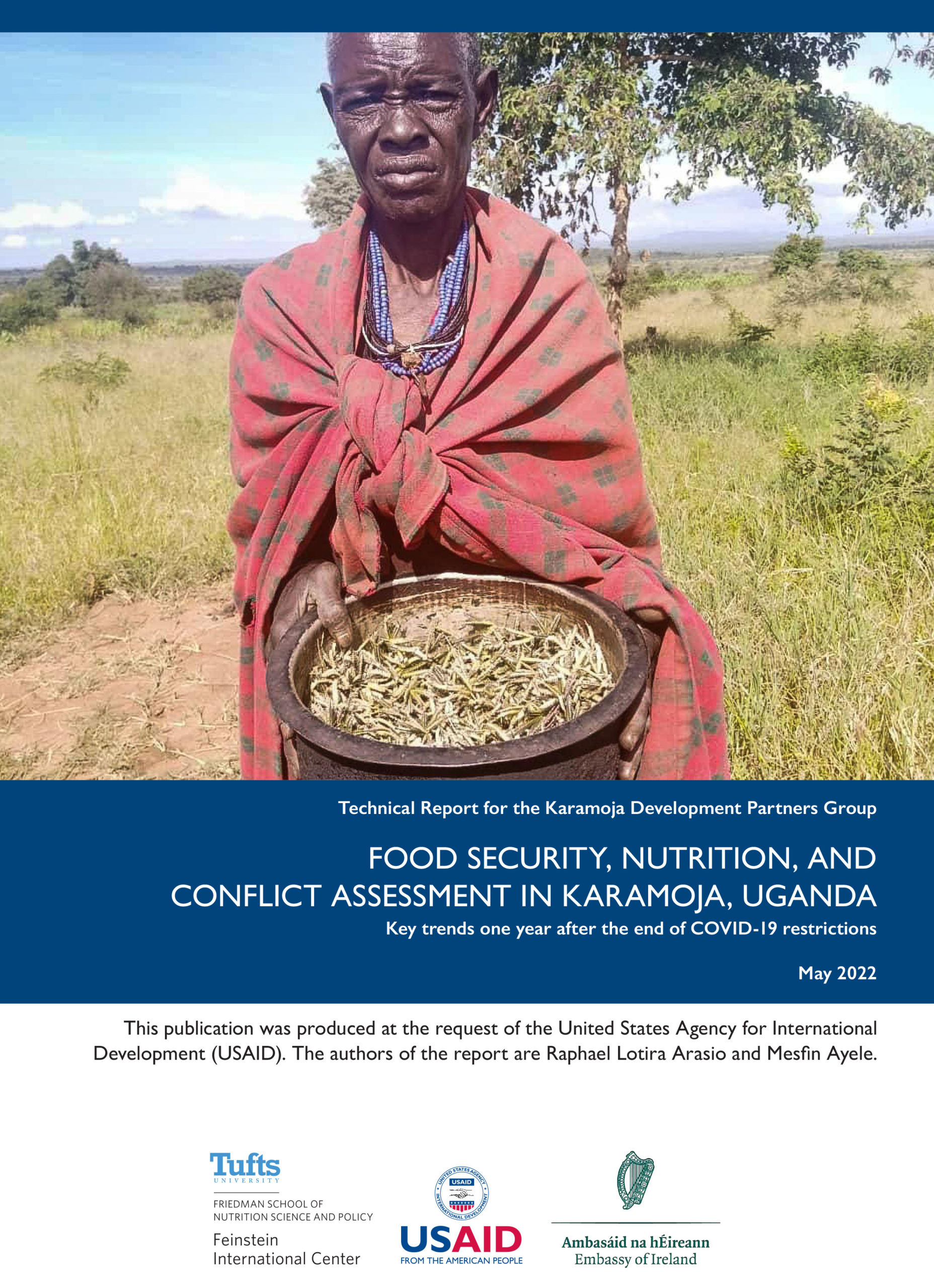
Food Security, Nutrition, and Conflict Assessment in Karamoja, Uganda
In mid-2020, the Karamoja Resilience Support Unit (KRSU) conducted a rapid assessment that described the impact of COVID-19 containment measures on rural livelihoods in Karamoja (Arasio et al. 20201). The assessment also forecast how disease restrictions would affect livelihoods over the following six to eight months (into early 2021). The initial assessment examined household wellbeing during COVID-19 relative to a normal (good) and bad (drought) year in Karamoja’s three main livelihood zones, represented by Amudat District (predominantly pastoralist but with some emerging crop production), Moroto District (predominantly agropastoralist), and Abim District (with high dependence on crop production, but also using livestock).
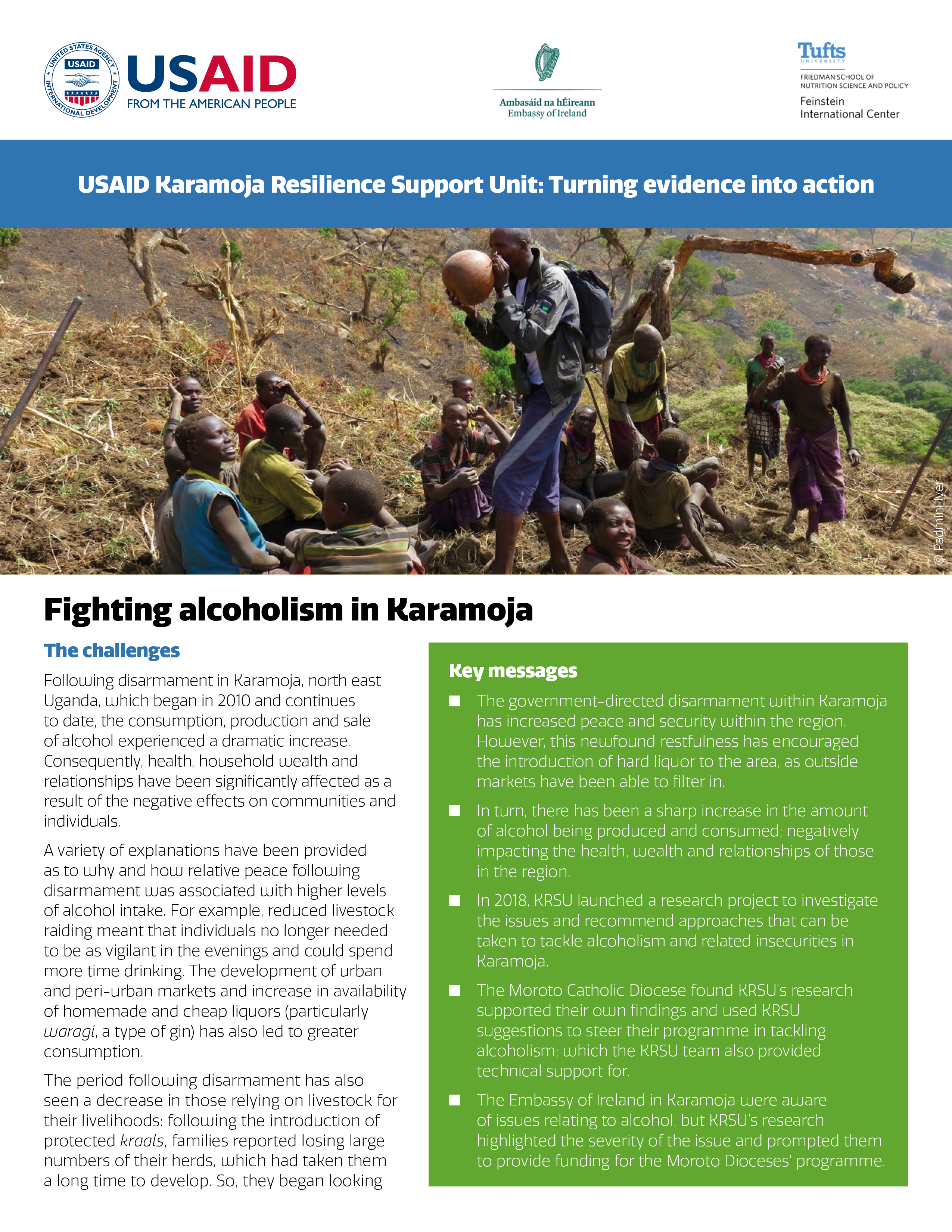
Fighting alcoholism in Karamoja
Following disarmament in Karamoja, north east Uganda, which began in 2010 and continues to date, the consumption, production and sale of alcohol experienced a dramatic increase. Consequently, health, household wealth and relationships have been significantly affected as a result of the negative effects on communities and individuals.
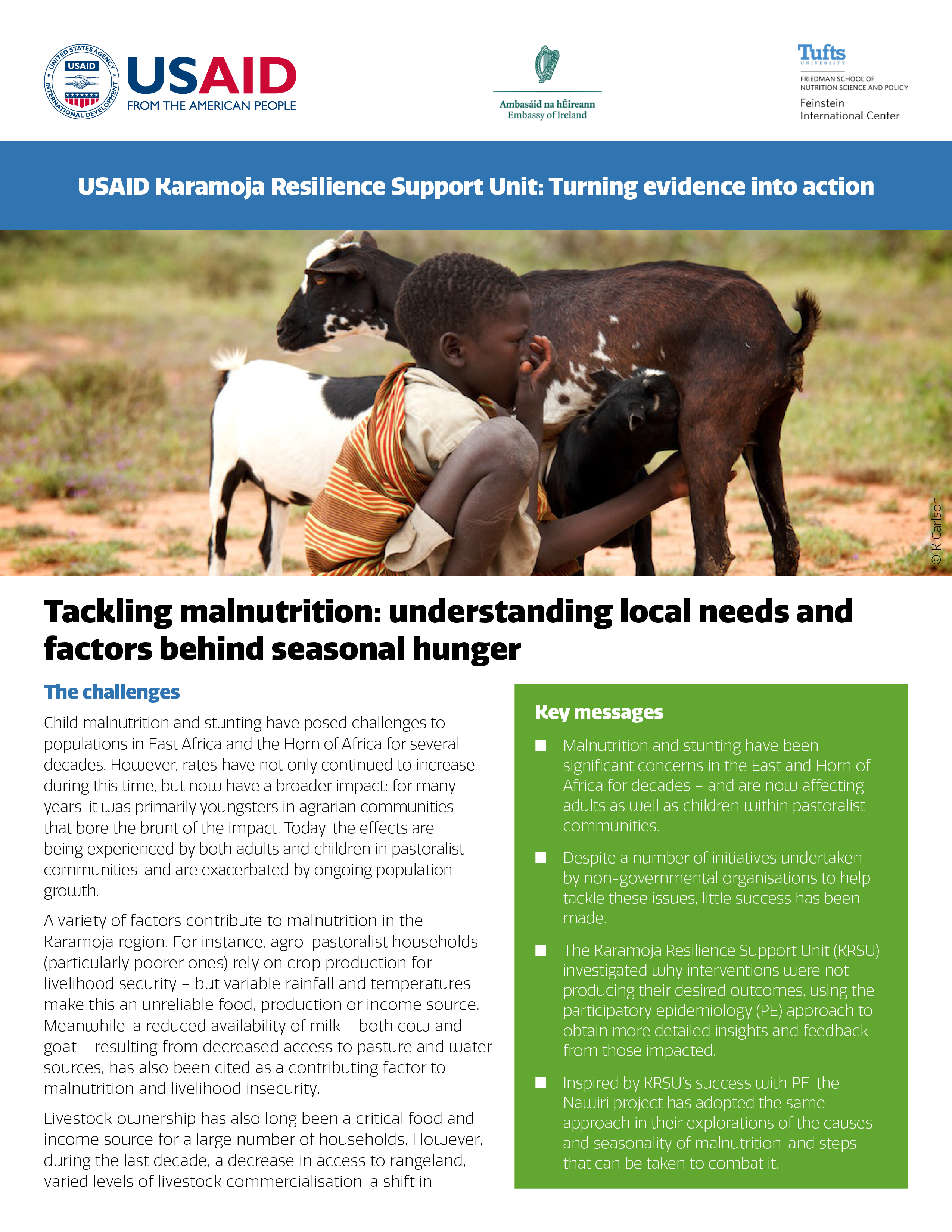
Tackling malnutrition: understanding local needs and factors behind seasonal hunger
Child malnutrition and stunting have posed challenges to populations in East Africa and the Horn of Africa for several decades. However, rates have not only continued to increase during this time, but now have a broader impact: for many years, it was primarily youngsters in agrarian communities that bore the brunt of the impact. Today, the effects are being experienced by both adults and children in pastoralist communities, and are exacerbated by ongoing population growth.

Livestock in Karamoja: improving markets and veterinary services
As Karamoja is a predominantly a pastoralist region, market trading of livestock is key to the region’s economy. However, a number of factors – ranging from policies and seasonality to price trends and market types – prevent livestock value chain actors from maximising their income and achieving livelihood security.

Improving practice: enhancing pastoralism policy
Although extensive research has been conducted into pastoralism, the sector – from its actors and systems to economic and environmental impacts – remains largely misunderstood. This is exacerbated by the fact that those living and working in pastoral communities often have trouble effectively expressing the processes they engage in and the benefits of pastoralism.
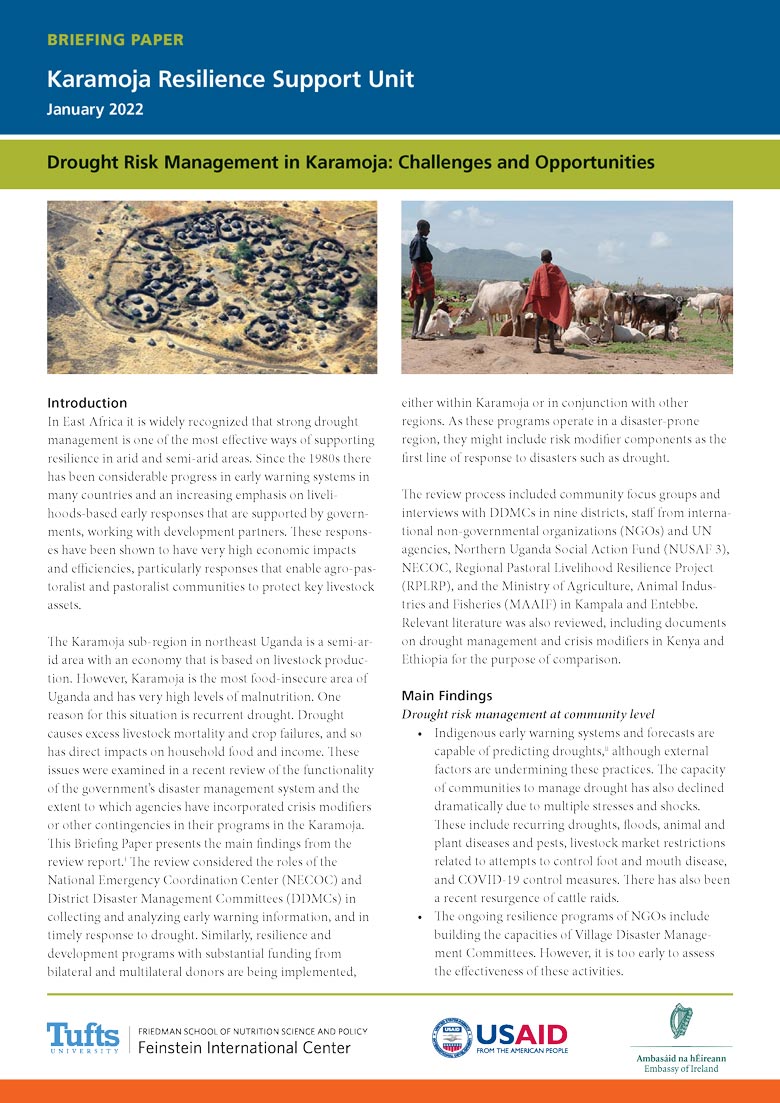
Drought Risk Management in Karamoja: Challenges and Opportunities
This Briefing Paper presents the main findings from the review report. The review considered the roles of the National Emergency Coordination Center (NECOC) and District Disaster Management Committees (DDMCs) in collecting and analyzing early warning information, and in timely response to drought.
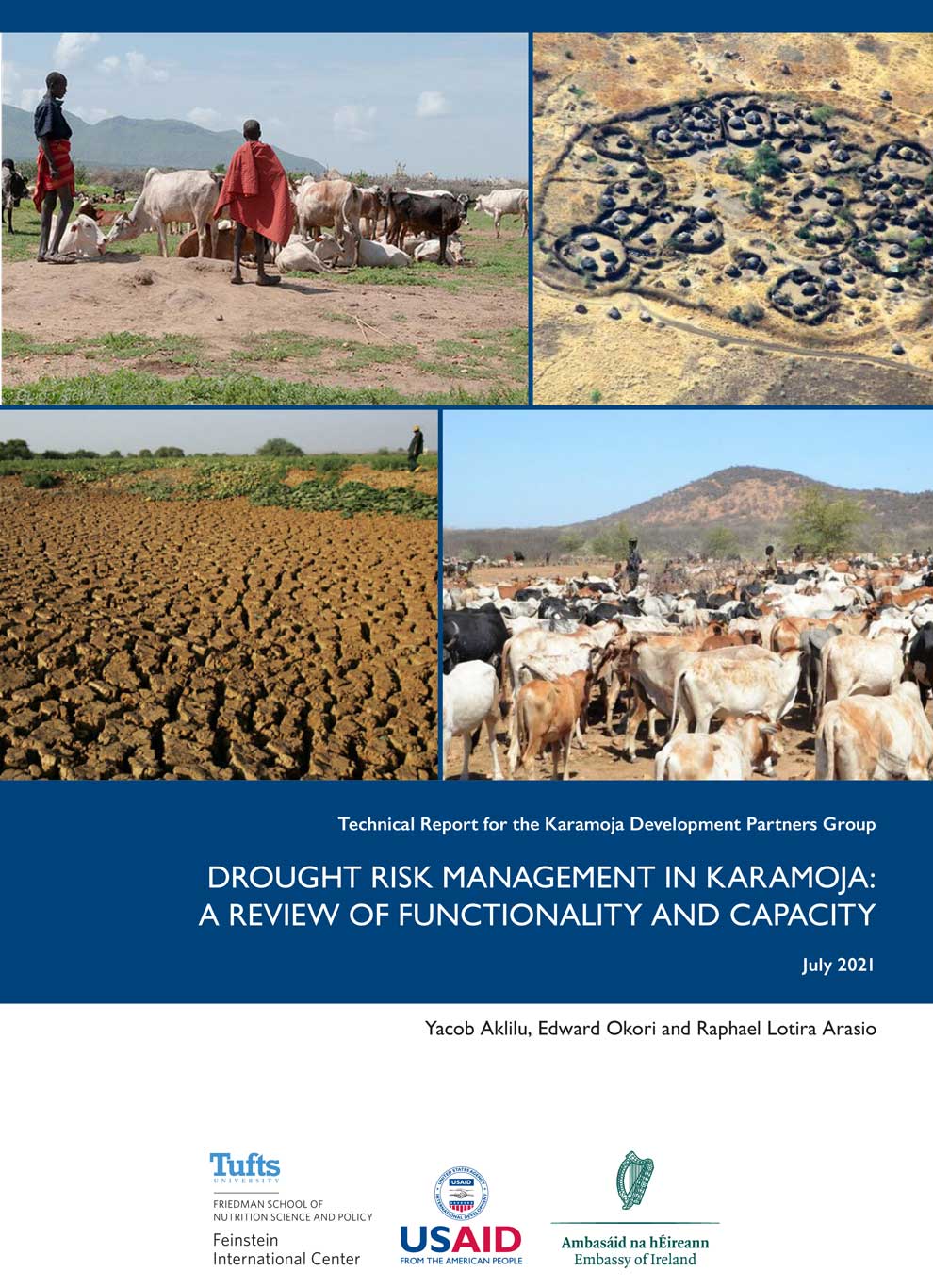
Drought Risk Management in Karamoja: A Review of Functionality and Capacity
In the history of Karamoja, drought has been one of the most important types of disaster, with major impacts on livelihoods. For livestock-owning households, drought can push both wealthy and poorer households into destitution, and the recovery of herds, their main form of financial capital, takes many years. Drought also has serious impacts on crop production and can decimate harvests. In the case of livestock interventions, there have been notable developments in effective drought response in many countries in the wider East Africa region, including novel partnerships between government, non-governmental organizations (NGOs) and private sector to provide early and more cost-effective programming.
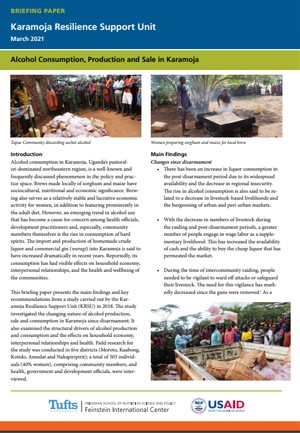
Alcohol Consumption, Production and Sale in Karamoja
Alcohol consumption in Karamoja, Uganda’s pastoralist-dominated northeastern region, is a well-known and frequently discussed phenomenon in the policy and practice space. Brews made locally of sorghum and maize have sociocultural, nutritional and economic significance. Brewing also serves as a relatively stable and lucrative economic activity for women, in addition to featuring prominently in the adult diet. However, an emerging trend in alcohol use that has become a cause for concern among health officials, development practitioners and, especially, community members themselves is the rise in consumption of hard spirits. The import and production of homemade crude liquor and commercial gin (waragi) into Karamoja is said to have increased dramatically in recent years. Reportedly, its consumption has had visible effects on household economy, interpersonal relationships, and the health and wellbeing of the communities.
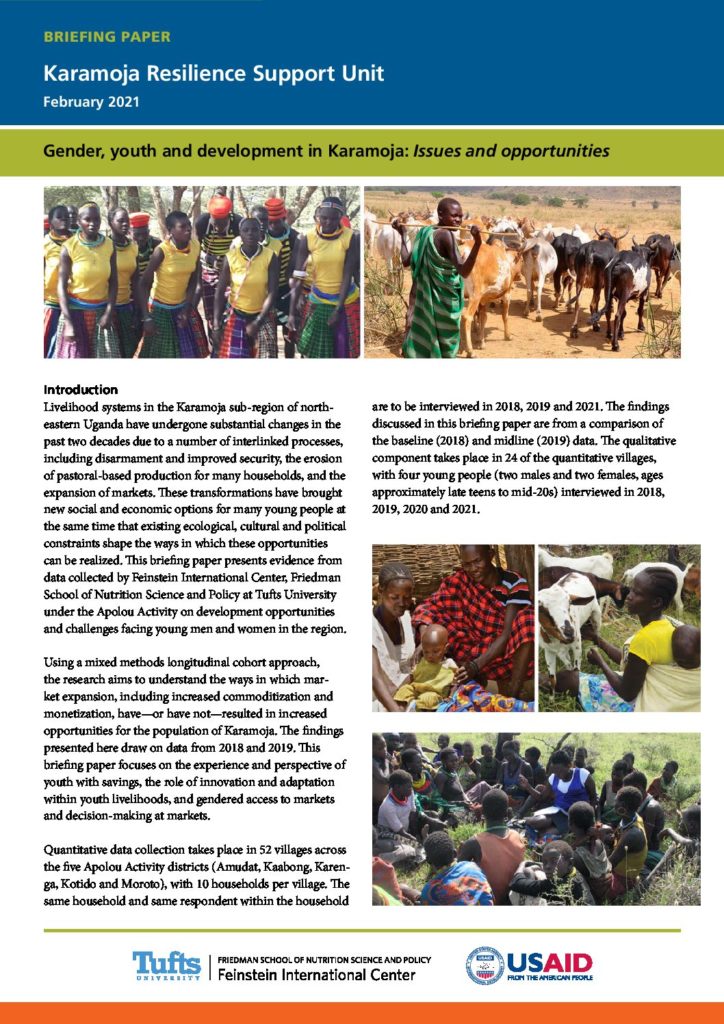
Gender, youth and development in Karamoja: Issues and opportunities
Livelihood systems in the Karamoja sub-region of northeastern Uganda have undergone substantial changes in the past two decades due to a number of interlinked processes, including disarmament and improved security, the erosion of pastoral-based production for many households, and the expansion of markets. These transformations have brought new social and economic options for many young people at the same time that existing ecological, cultural and political constraints shape the ways in which these opportunities can be realized. This briefing paper presents evidence from data collected by Feinstein International Center, Friedman School of Nutrition Science and Policy at Tufts University under the Apolou Activity on development opportunities and challenges facing young men and women in the region.
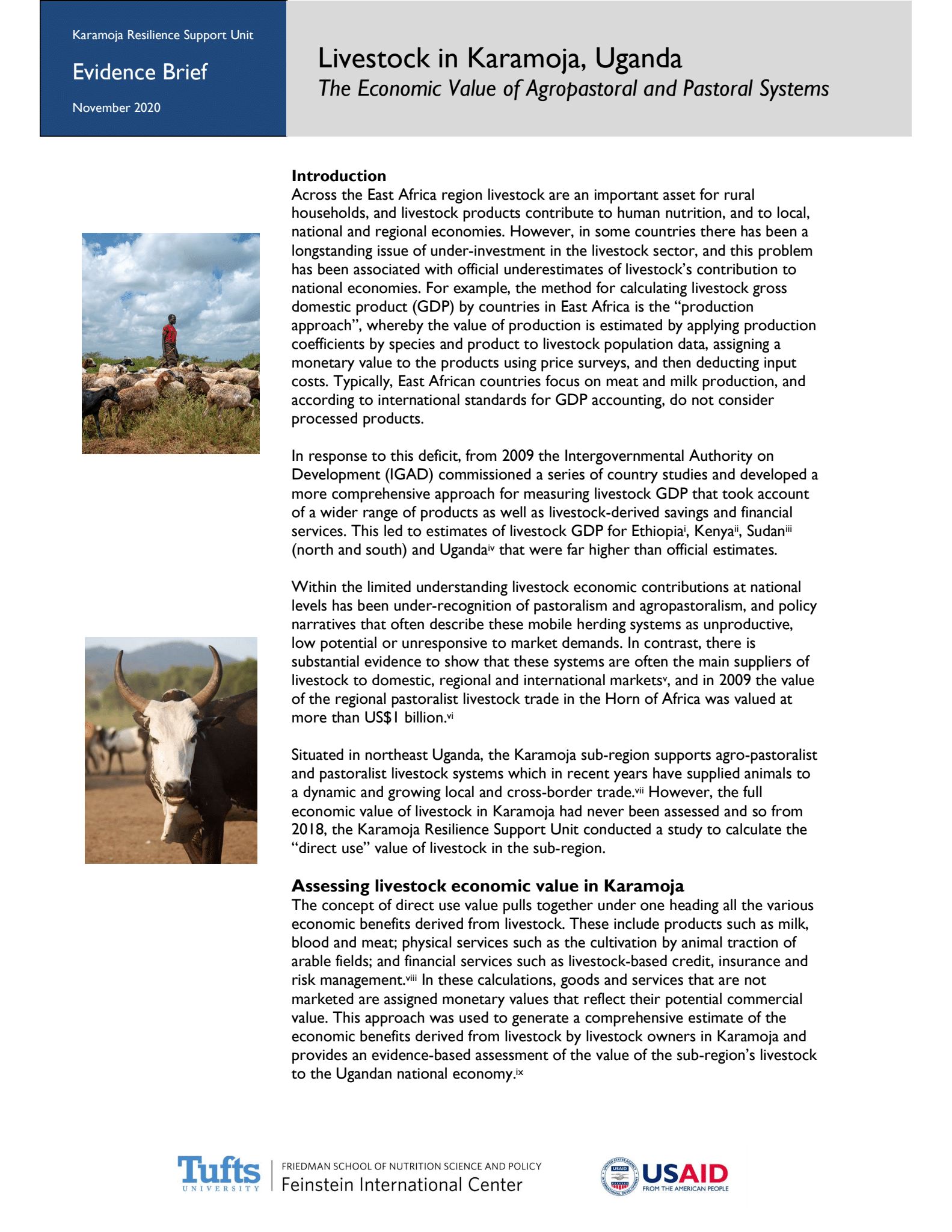
Livestock in Karamoja, Uganda- The Economic Value of Agropastoral and Pastoral Systems
Across the East Africa region livestock are an important asset for rural households, and livestock products contribute to human nutrition, and to local, national and regional economies. However, in some countries there has been a longstanding issue of under-investment in the livestock sector, and this problem has been associated with official underestimates of livestock’s contribution to national economies.
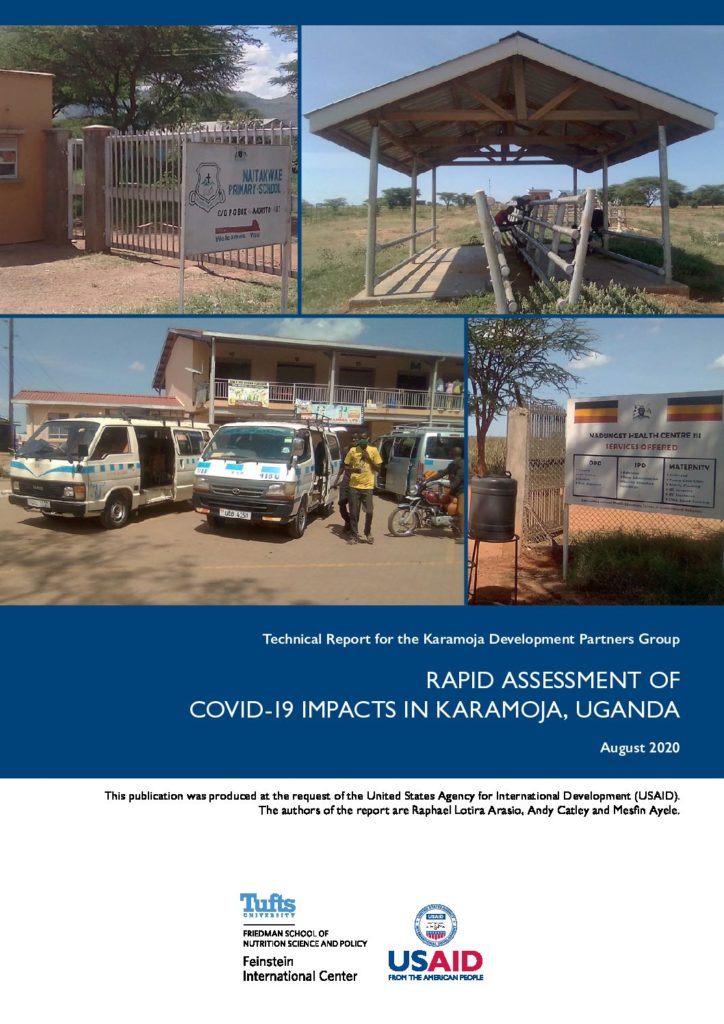
Rapid Assessment of COVID-19 impacts in Karamoja, Uganda
This technical report describes the impacts of coronavirus disease 2019 (COVID-19) restrictions in the Karamoja sub-region of Uganda, based on field assessments in Amudat, Moroto and Abim Districts. The COVID-19 prevention guidelines that prompted total lockdown measures included market closure and travel restrictions which in turn affected the essential economic activities of many households, especially the poor. These restrictions were implemented in March 2020 and were still in place in August 2020.
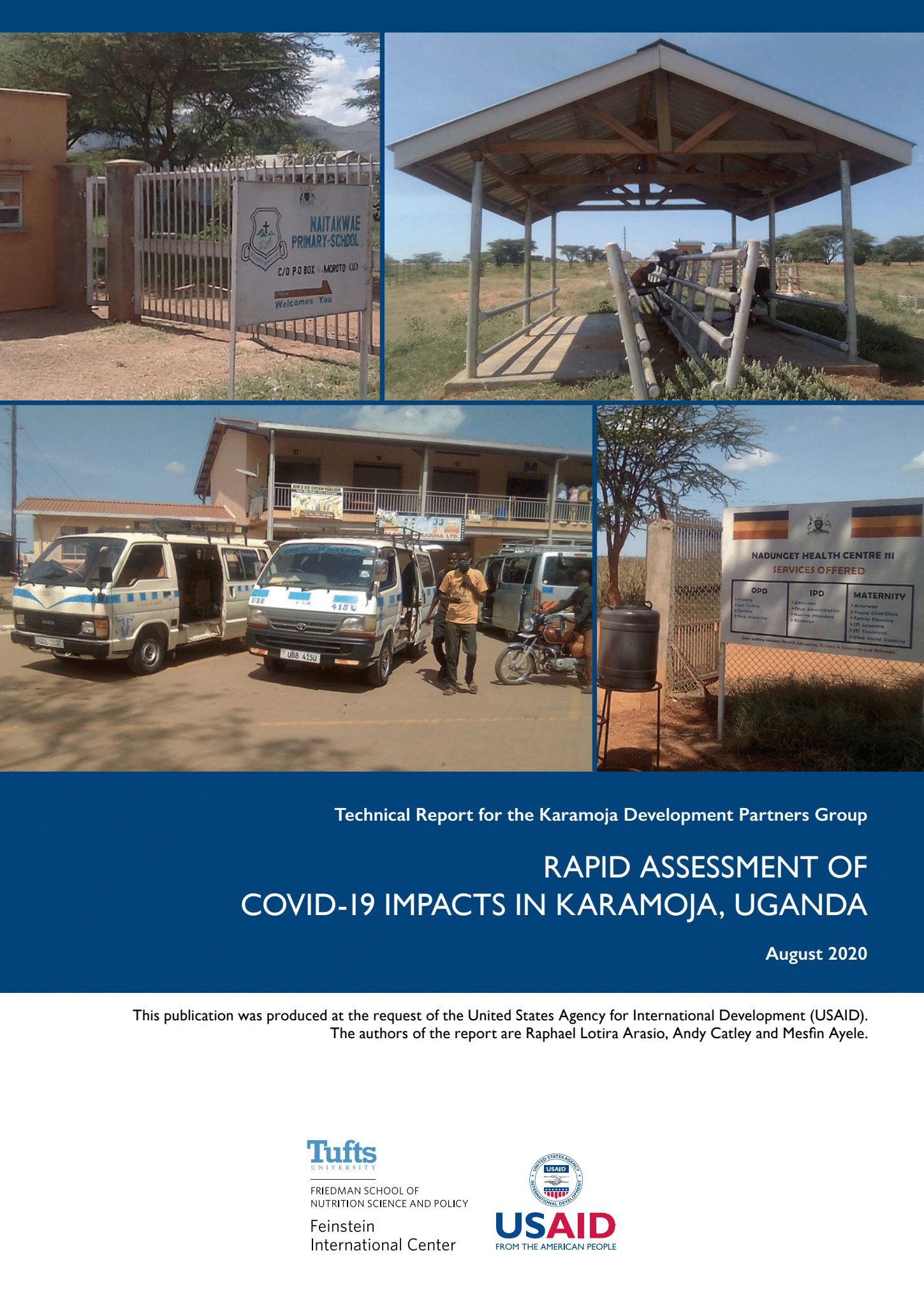
RAPID ASSESSMENT OF COVID-19 IMPACTS IN KARAMOJA, UGANDA
This technical report describes the impacts of coronavirus disease 2019 (COVID-19) restrictions in the Karamoja sub-region of Uganda, based on field assessments in Amudat, Moroto and Abim Districts. The COVID-19 prevention guidelines that prompted total lockdown measures included market closure and travel restrictions which in turn affected the essential economic activities of many households, especially the poor.
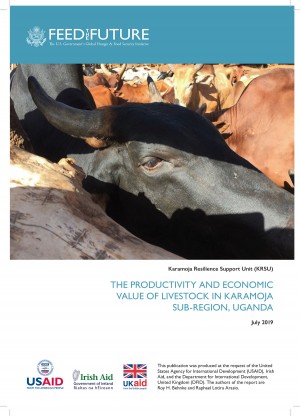
The Productivity and Economic Value of Livestock in Karamoja Sub-Region, Uganda
Across the East Africa region livestock are an important asset for rural households, and livestock products contribute to human nutrition, and to local, national and regional economies. However, in some countries there has been a longstanding issue of under-investment in the livestock sector, and this problem has been associated with official underestimates of livestock’s contribution to national economies.
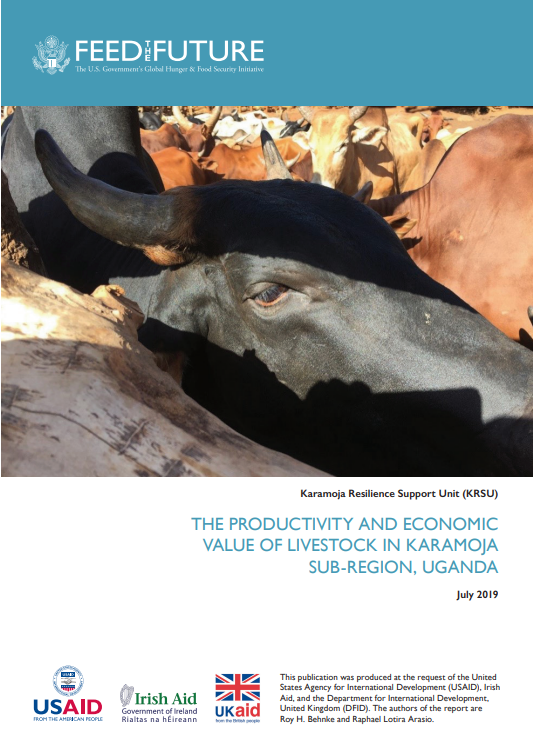
THE PRODUCTIVITY AND ECONOMIC VALUE OF LIVESTOCK IN KARAMOJA SUB-REGION, UGANDA
This report calculates the direct use value of livestock in Karamoja Sub-region, Uganda. The concept of direct use value pulls together under one heading all the various economic benefits derived from livestock.
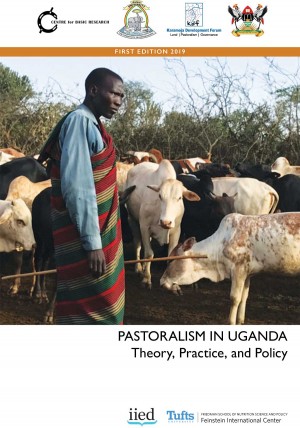
Pastoralism in Uganda Theory, Practice, and Policy
This textbook is a general reference on pastoralism theory, practice, and policy. It enables students and other readers from various professional backgrounds to understand how pastoralism functions as a system, its contributions to local, national, regional, and global economies and sustainable environmental management, and its role in promoting peace and harmony between pastoral and other communities.
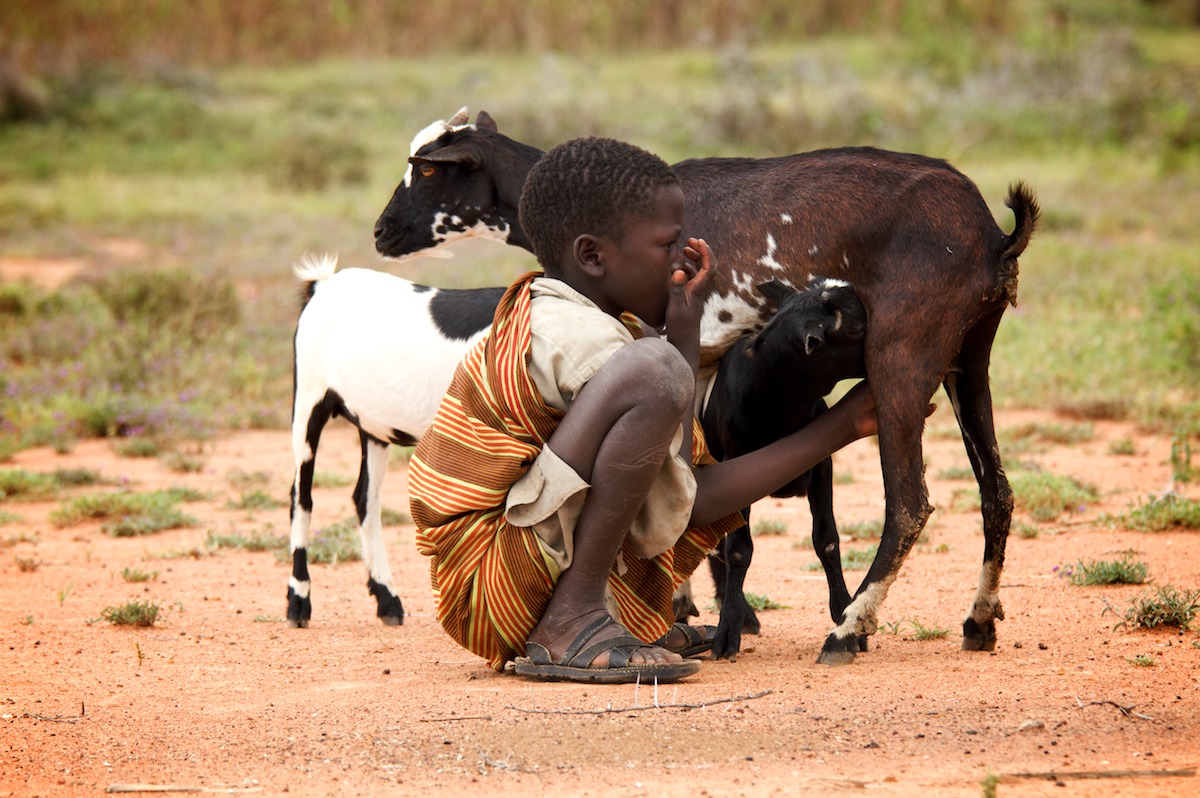
Enablers, Difficulties and Hindrances of Nutrition Recommendations Applications in Nadunget sub-county – An Analysis of Women’s Perceptions
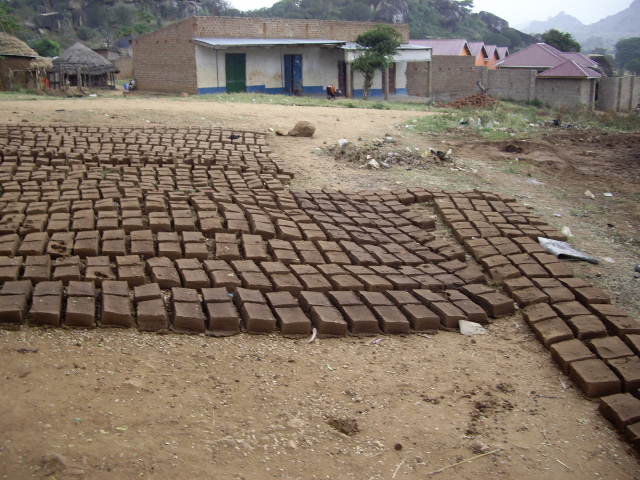
The Role of Disaster Risk Financing in Building Resilience in Poor Communities in Karamoja
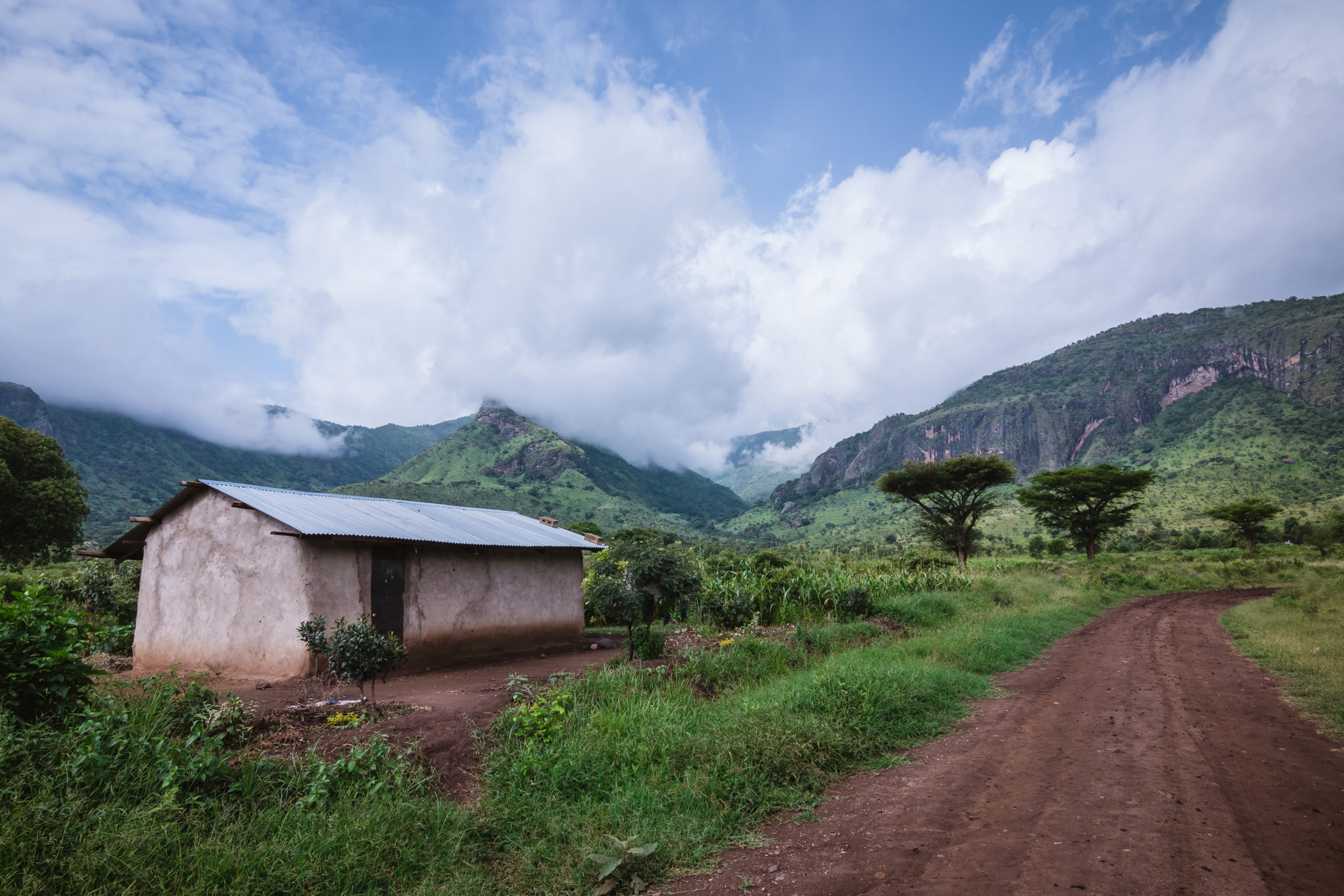
Digging for Power: A Research into Women’s Experience of Extractive Industries Development in Karamoja


Key Barriers and Enablers of Consumption of Animal Source Foods by Women in Four Districts of Southern Karamoja

Using Creative Research Methodologies to Understand Adolescent Nutrition Realities in Kenya and Uganda

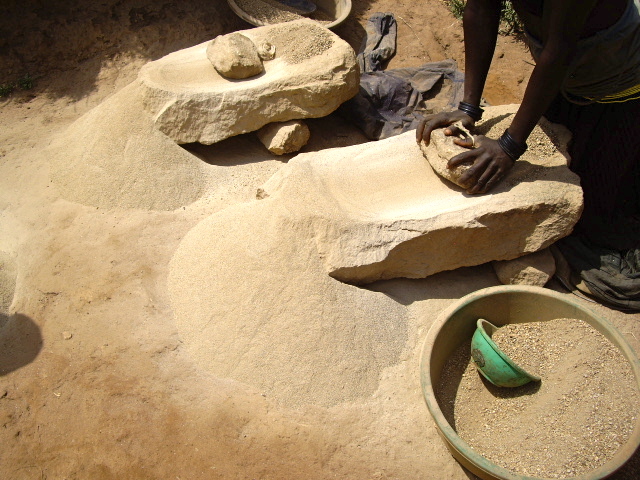
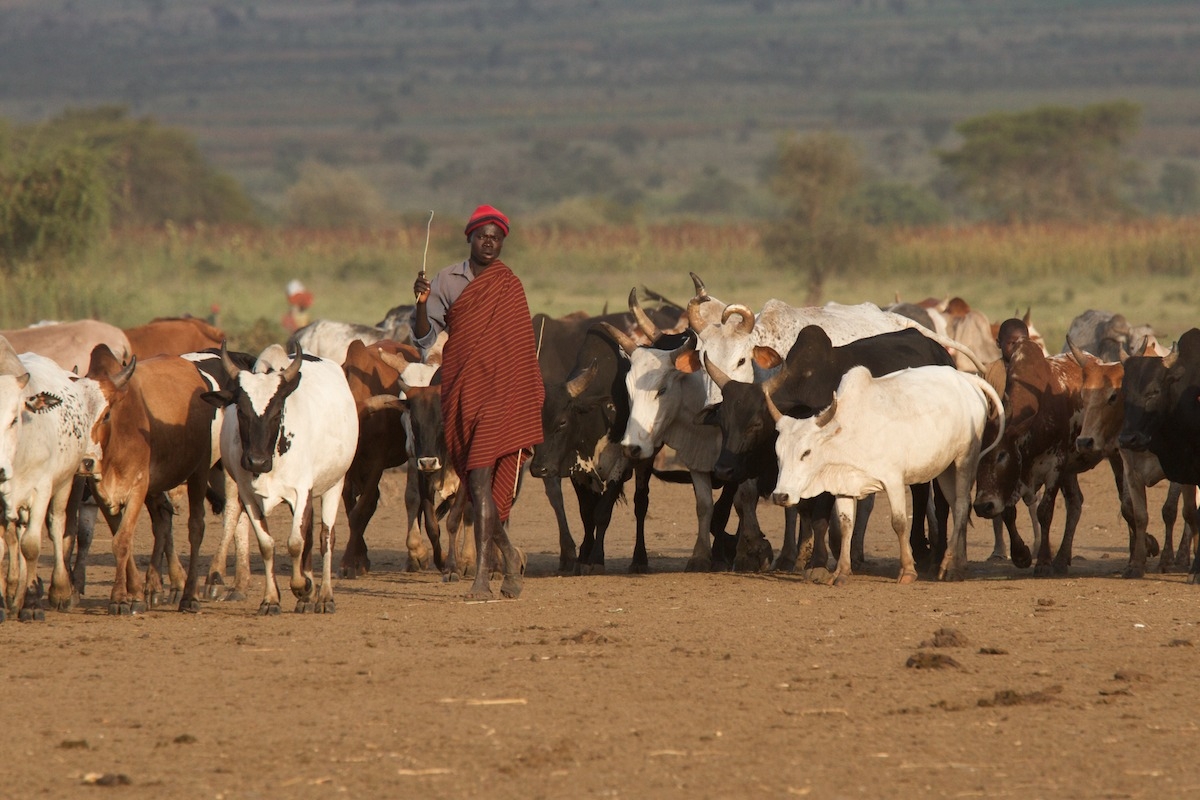
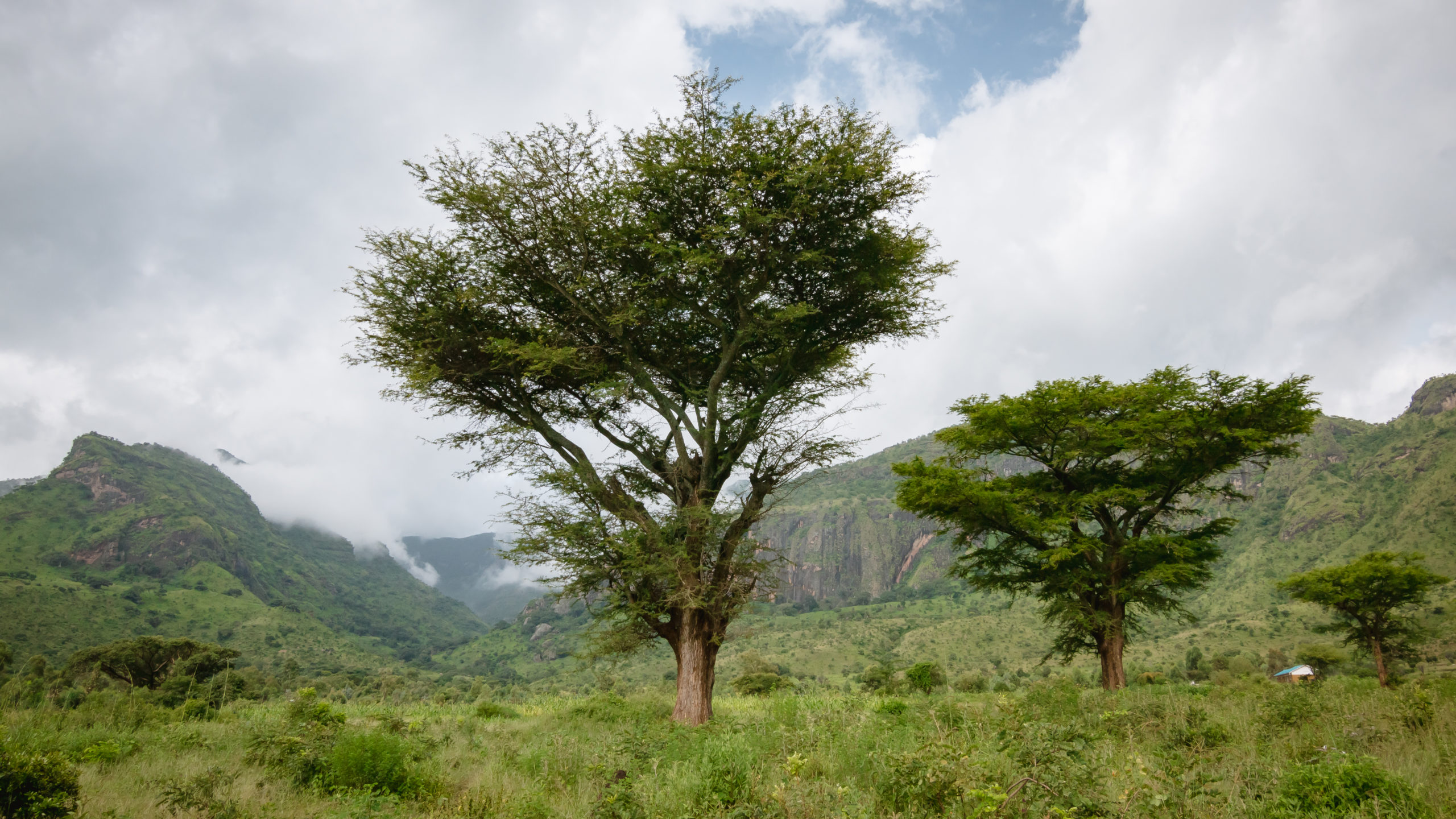
Appreciative Enquiry to Traditional Land Administration in Karamoja, Uganda: An Opportunity for Transformative Conflict Management

The Cosmo-Politics of a Land Deal at the Kalobeyi Refugee Settlement in Turkana, Kenya
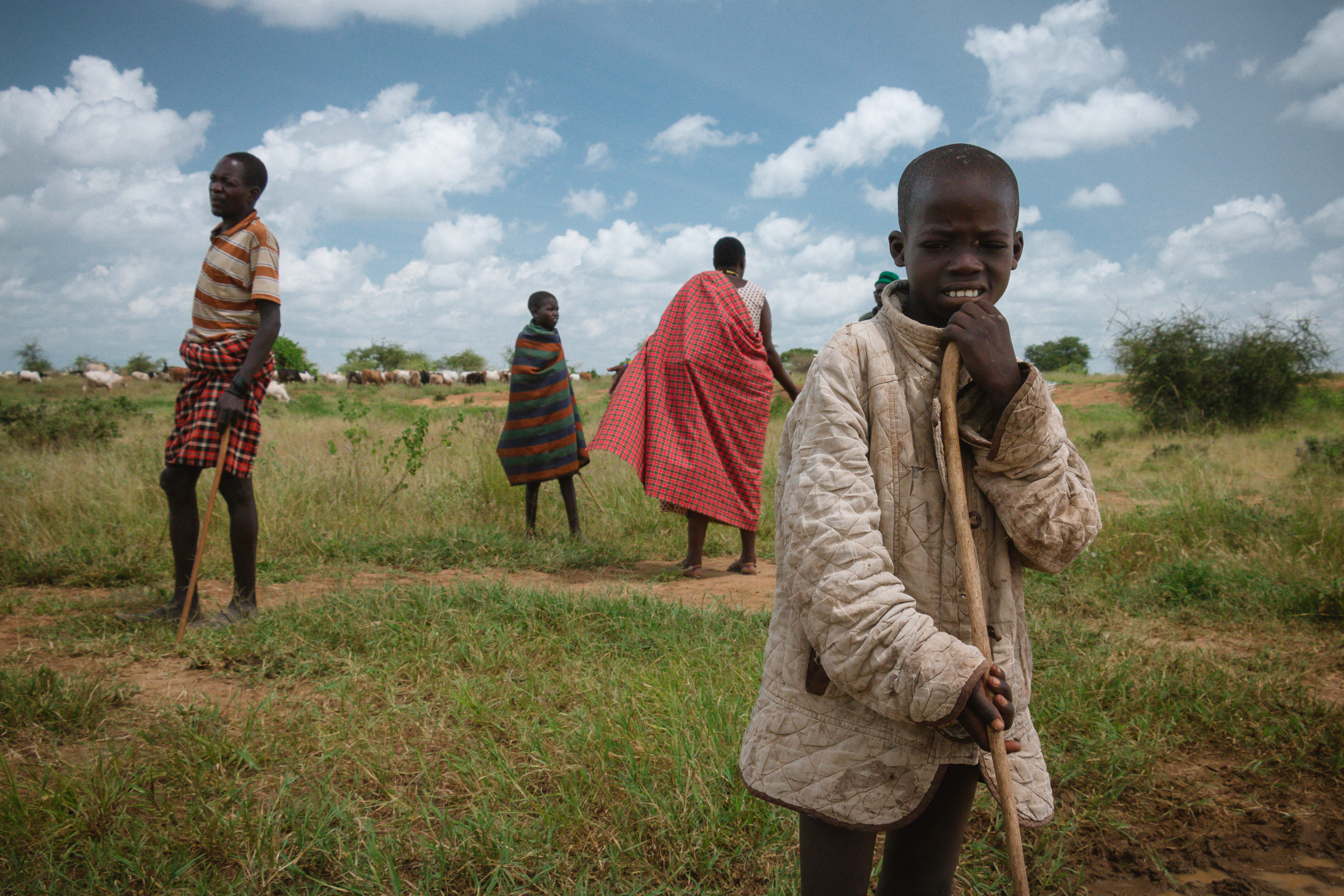
Pathways from Peace to Resilience: Examples from Karamoja and the Greater Horn of Africa

Friendship, Kinship and Social Risk Management Strategies Among Pastoralists in Karamoja

Women’s Knowledge Systems and Peace Building Among the Pastoral Communities of Northern Kenya: A Special reference to West Pokot County

Gender Dynamics and Water Conflicts in Communal Boreholes in Turkana County, Kenya


Determinant’s for Children’s Malnutrition in Nadunget and Namalu sub-counties in Karamoja, Northern Uganda
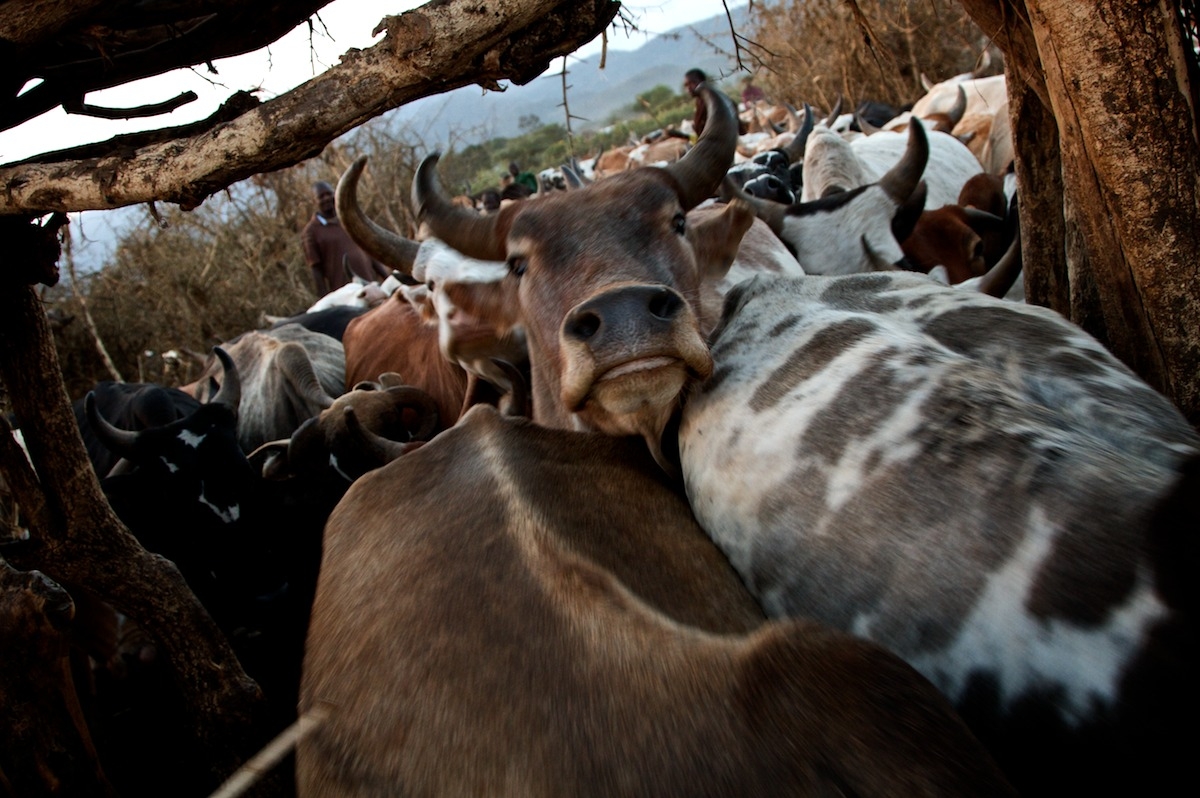

Distress Sales of Cattle by the Bodi: Agro-Pastoralists Subsidizing Sugar Industrialization in the lower Omo Valley, Ethiopia


Green Water and Livestock Mobility in Karamoja: Understanding the Karamoja phrase “We follow our water”



Understanding Competing Border Narratives; Access to Resources and Conflicts in Karamoja

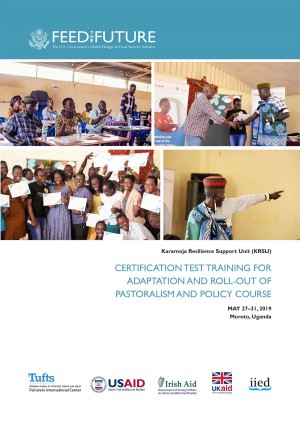
Certification Test Training For Adaptation and Roll-out of Pastoralism and Policy Course
The Karamoja Resilience Support Unit (KRSU), in partnership with the International Institute for Environment and Development (IIED), commissioned the adaptation and roll-out of the East African Pastoralism and Policy Course (PPC) and has completed the final training of trainers (ToT) course.
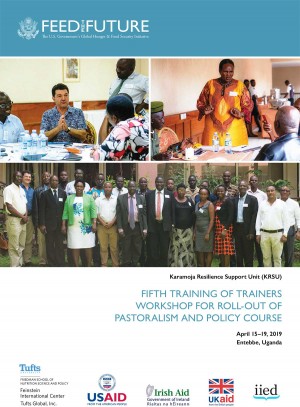
Fifth Training of Trainers Workshop for Roll-out of Pastoralism and Policy Course
The Karamoja Resilience Support Unit (KRSU), in partnership with the International Institute for Environment and Development (IIED), commissioned the adaptation and roll-out of the East African Pastoralism and Policy Course (PPC) and has completed the final training of trainer’s (ToT) course.
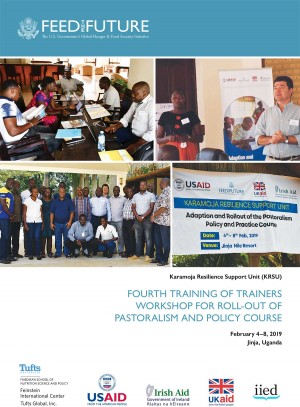
Fourth Training of Trainers Workshop for Roll-out of Pastoralism and Policy Course
The Karamoja Resilience Support Unit (KRSU), in partnership with the International Institute for Environment and Development (IIED), commissioned the adaptation and roll-out of the East African Pastoralism and Policy Course (PPC) and has completed the final training of trainer’s (ToT) course.
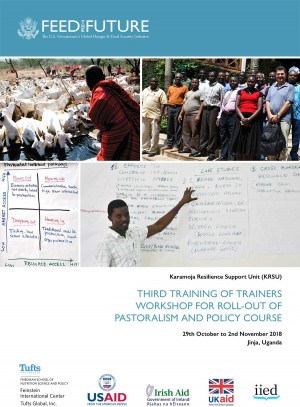
Third Training of Trainers Workshop for Roll-out of Pastoralism and Policy Course
The Karamoja Resilience Support Unit (KRSU), in partnership with the International Institute for Environment and Development (IIED), commissioned the adaptation and roll-out of the East African Pastoralism and Policy Course (PPC) and has completed the final training of trainer’s (ToT) course.
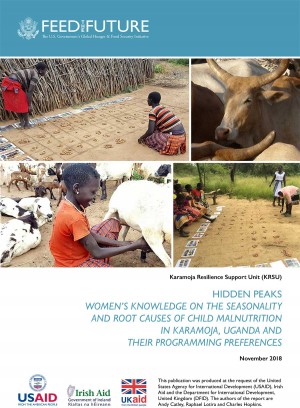
Hidden Peaks: Women’s Knowledge on the Seasonality and Root Causes of Child Malnutrition in Karamoja, Uganda and Their Programming Preferences
This report from the KRSU uses participatory epidemiology to understand women’s knowledge on the seasonality and causes of child malnutrition in Karamoja. The report provides important new information on the timing of peaks in child malnutrition, women’s views on the main causes of malnutrition and the relative importance of these causes, and women’s preferences for programs to reduce malnutrition
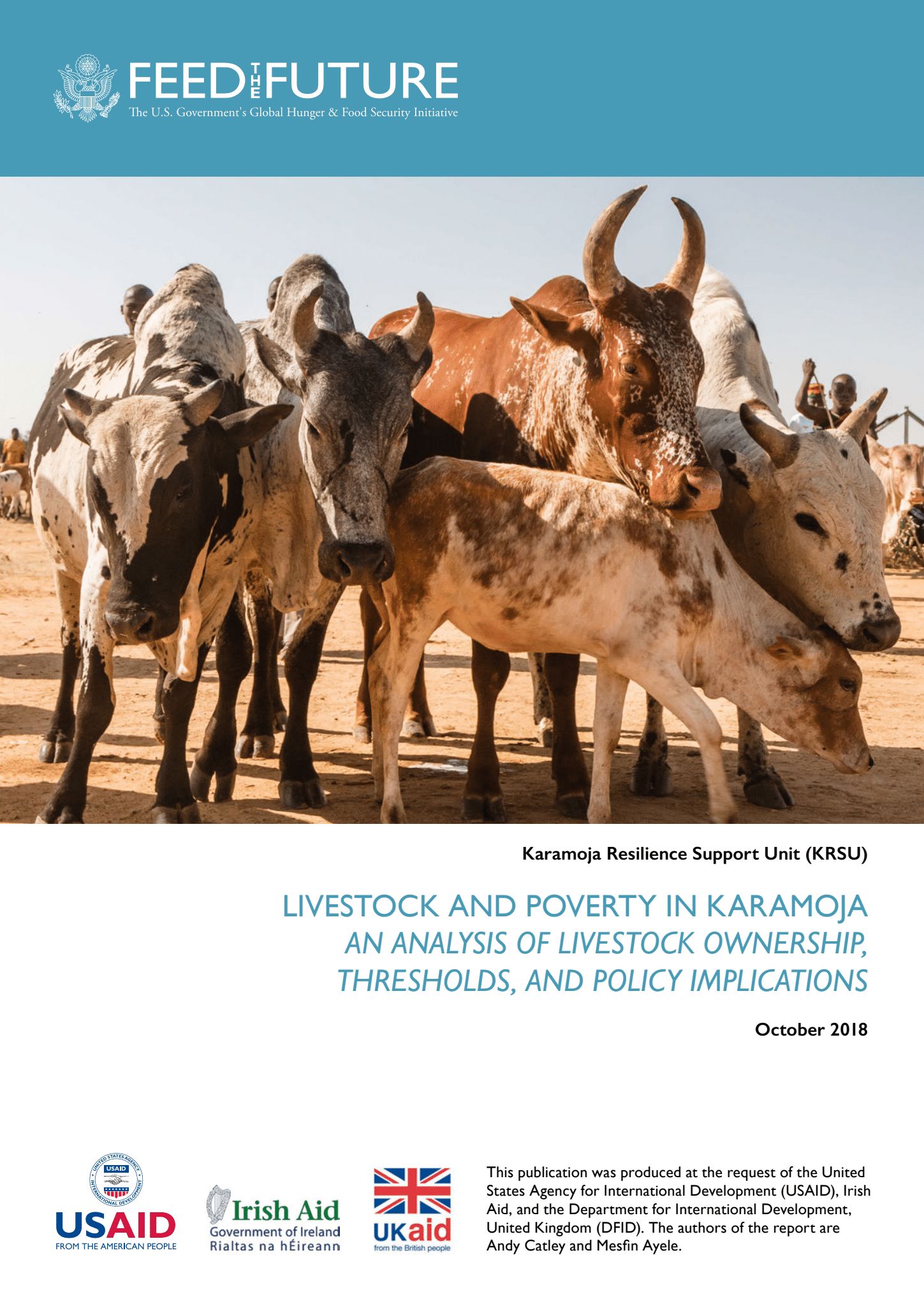
LIVESTOCK AND POVERTY IN KARAMOJA AN ANALYSIS OF LIVESTOCK OWNERSHIP, THRESHOLDS, AND POLICY IMPLICATIONS
In pastoralist and agro-pastoralist households in East Africa, livestock not cash are usually the main financial asset. Animals are sold to buy grain and to meet other domestic needs, and animals also provide food, especially milk, for direct human consumption.
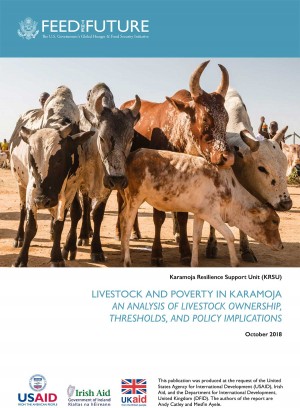
Livestock and Poverty in Karamoja – An Analysis of Livestock Ownership, Thresholds, and Policy Implications
This report analyses poverty in Karamoja from the perspective of livestock ownership, and uses a livestock threshold to categorize households as poor and non-poor. High levels of livestock poverty are then discussed in relation to programming and policy options
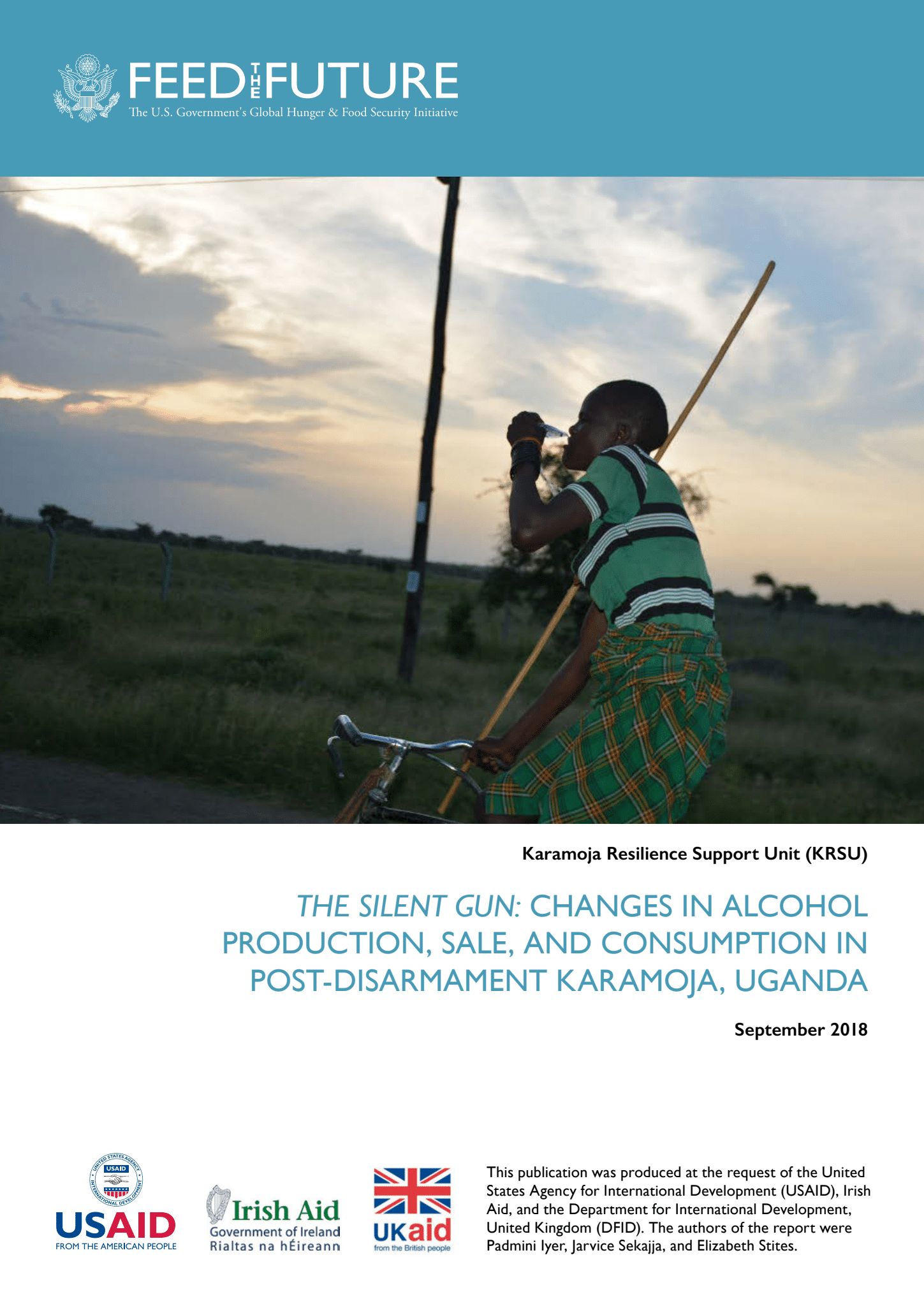
THE SILENT GUN: CHANGES IN ALCOHOL PRODUCTION, SALE, AND CONSUMPTION IN POST-DISARMAMENT KARAMOJA, UGANDA
Research and observations over the past decade have pointed to the high prevalence of alcohol use in Karamoja. Brews made locally of sorghum and maize have sociocultural, nutritional, and economic significance.
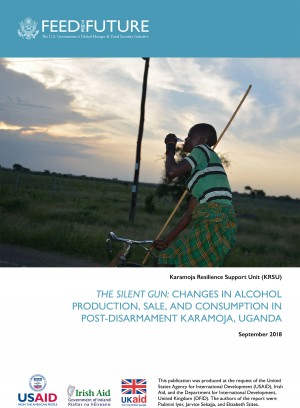
The Silent Gun: Changes in Alcohol Production, Sale and Consumption in Post-disarmament Karamoja, Uganda
Investigation into changes in alcohol production, sale, and consumption in Karamoja since the start of the 2006 disarmament campaign.
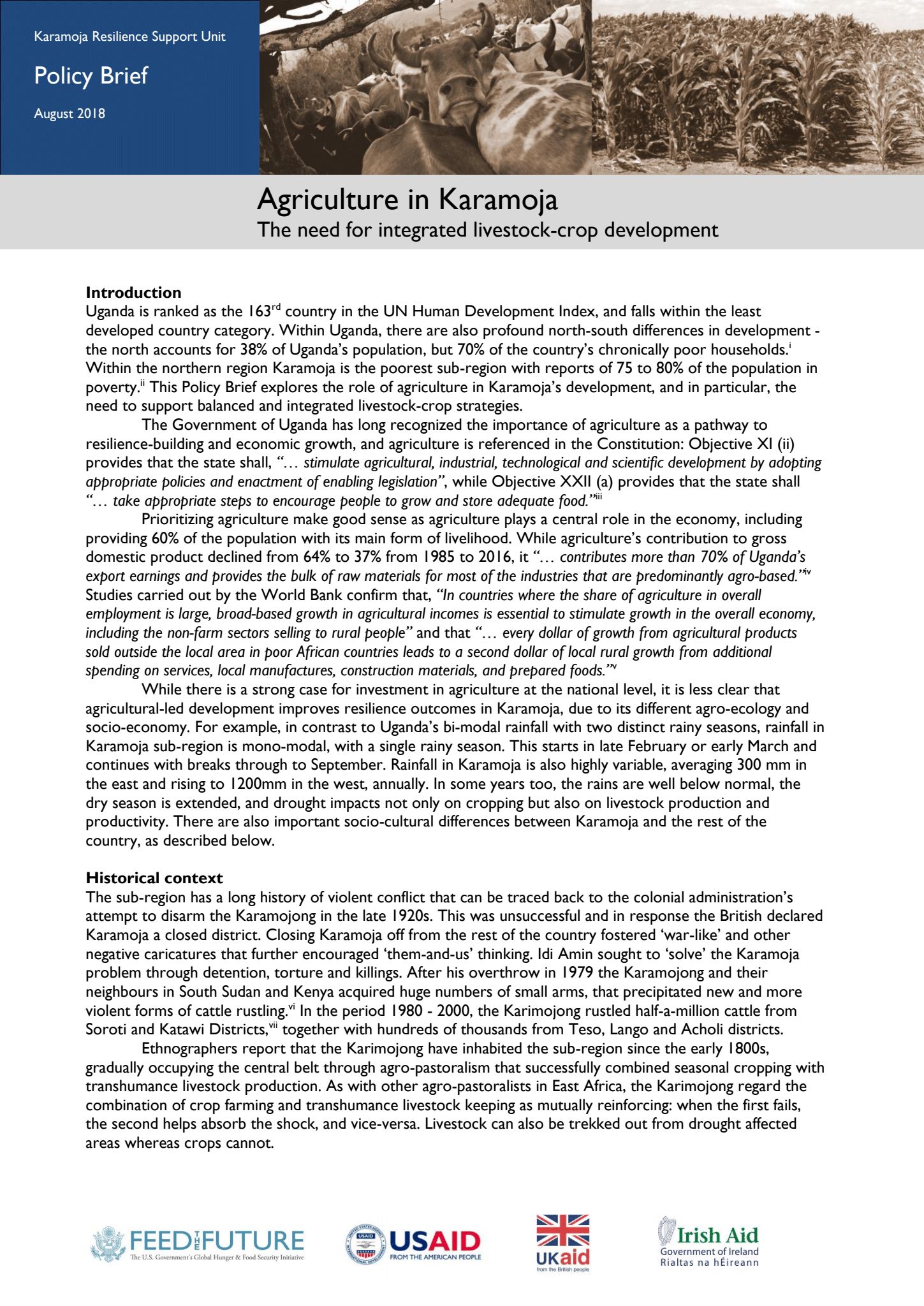
Agriculture in Karamoja-The need for integrated livestock-crop development
This Policy Brief explores the role of agriculture in Karamoja’s development, and in particular, the need to support balanced and integrated livestock-crop strategies.
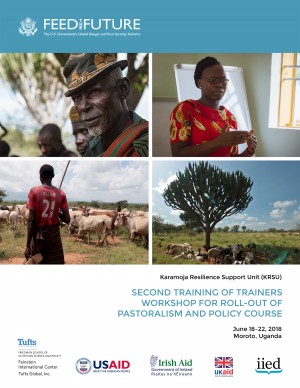
Second Training of Trainers Workshop for Roll-out of Pastoralism and Policy Course
The Karamoja Resilience Support Unit (KRSU), in partnership with the International Institute for Environment and Development (IIED), commissioned the adaptation and roll-out of the East African Pastoralism and Policy Course (PPC) and has completed the final training of trainer’s (ToT) course.
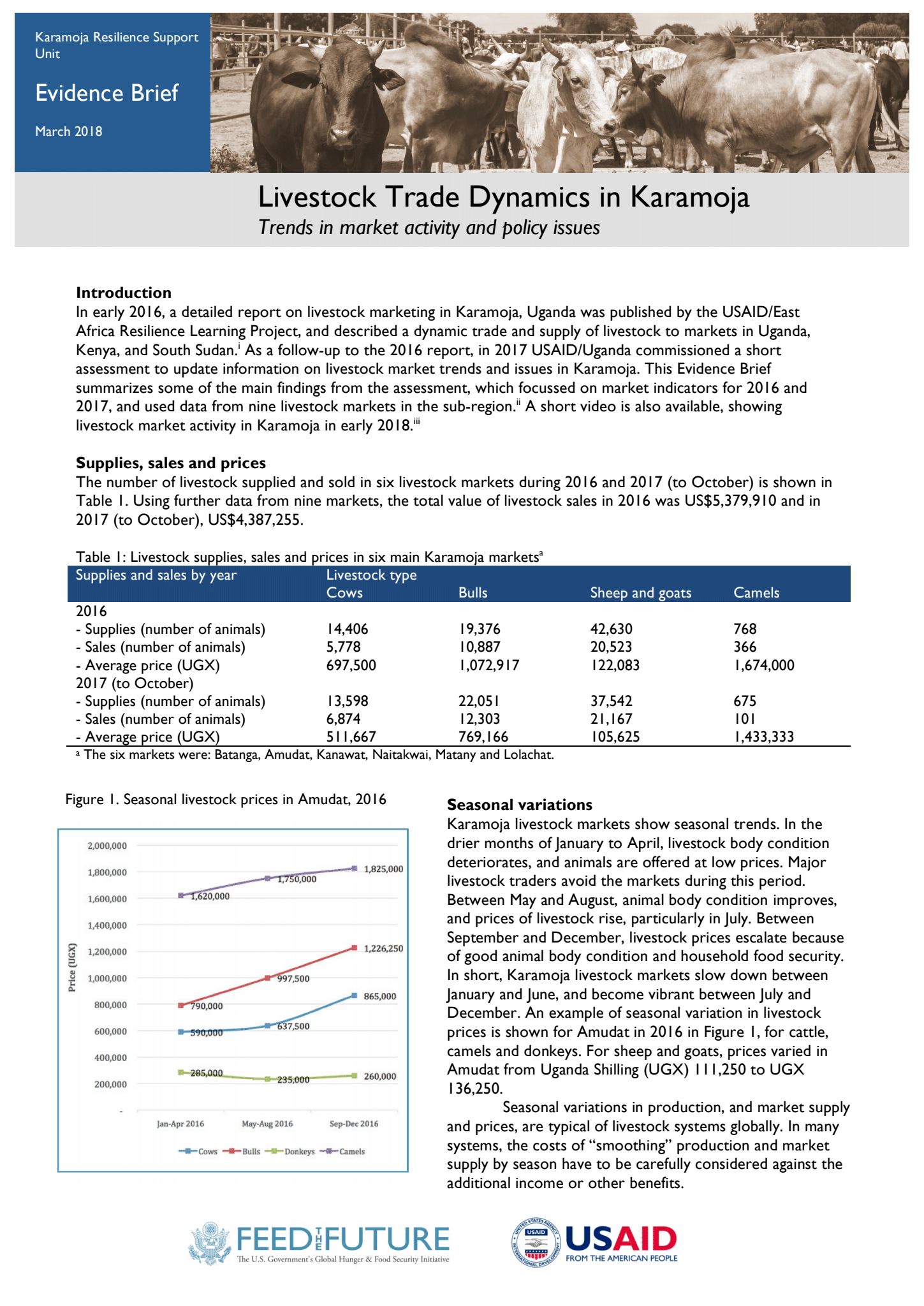
Livestock Trade Dynamics in Karamoja-Trends in market activity and policy issues
In early 2016, a detailed report on livestock marketing in Karamoja, Uganda was published by the USAID/East Africa Resilience Learning Project, and described a dynamic trade and supply of livestock to markets in Uganda, Kenya, and South Sudan. As a follow-up to the 2016 report, in 2017 USAID/Uganda commissioned a short assessment to update information on livestock market trends and issues in Karamoja.
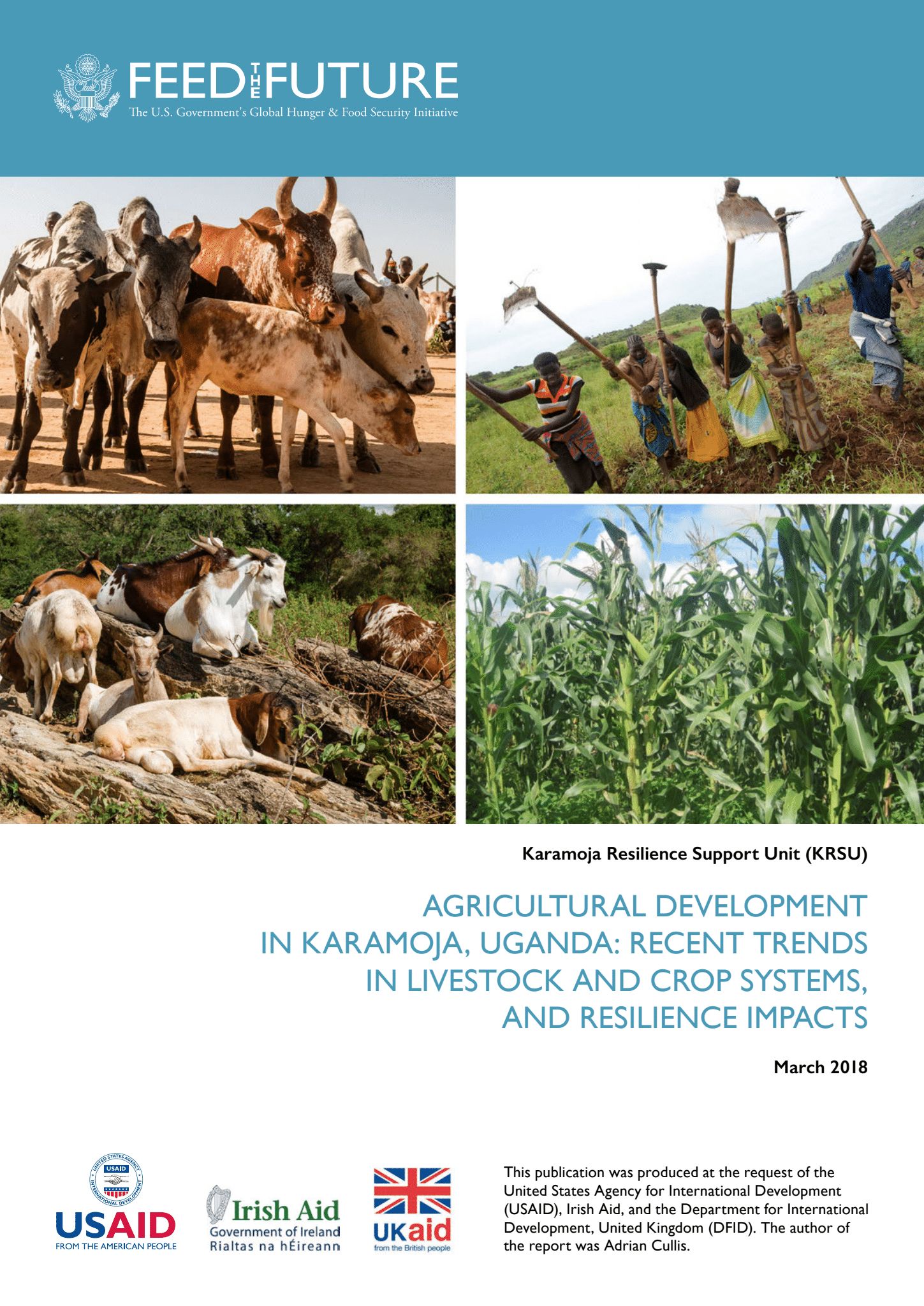
AGRICULTURAL DEVELOPMENT IN KARAMOJA, UGANDA: RECENT TRENDS IN LIVESTOCK AND CROP SYSTEMS, AND RESILIENCE IMPACTS
This report is a review of agricultural development trends in the Karamoja sub-region of northeast Uganda. The review covered both crop farming and transhumance livestock management and examined agriculture at the levels of both policy and programming.
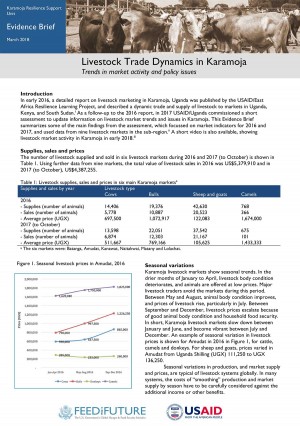
Livestock Trade Dynamics in Karamoja
In early 2016, a detailed report on livestock marketing in Karamoja, Uganda was published by the USAID/East Africa Resilience Learning Project, and described a dynamic trade and supply of livestock to markets in Uganda, Kenya, and South Sudan.
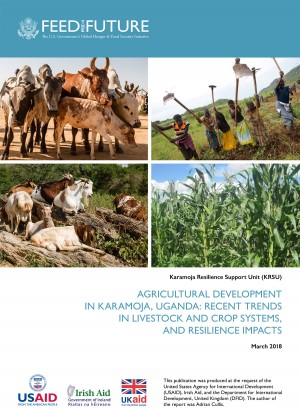
Agricultural Development in Karamoja, Uganda: Recent Trends in Livestock and Crop Systems, and Resilience Impacts
This review by the KRSU examines policy and programming on livestock and crop production in Karamoja’s drylands, and makes recommendations to take account of Karamoja’s unique environment within Uganda.
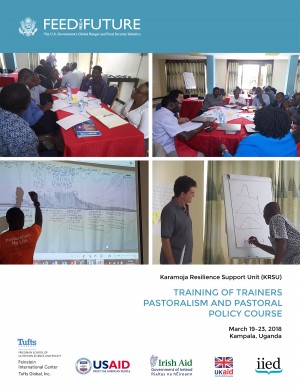
Training of Trainers Pastoralism and Pastoral Policy Course (One)
The Karamoja Resilience Support Unit (KRSU), in partnership with the International Institute for Environment and Development (IIED), commissioned the adaptation and roll-out of the East African Pastoralism and Policy Course (PPC) and has completed the final training of trainer’s (ToT) course.
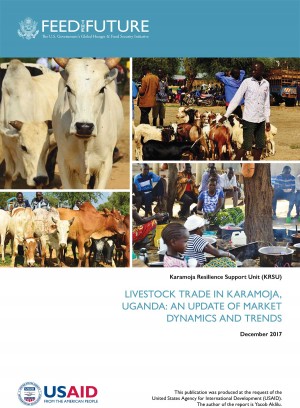
Livestock Trade in Karamoja Uganda – An Update of Market Dynamics and Trends
The KRSU has released an update on livestock marketing in Karamoja, providing comprehensive information on markets dynamics, price and volume trends, and other market performance indicators.
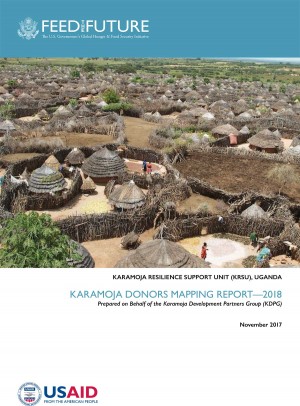
Donor Mapping Report
This report summarizes planned humanitarian and development activities of nine bilateral donors in the Karamoja sub-region in 2018.
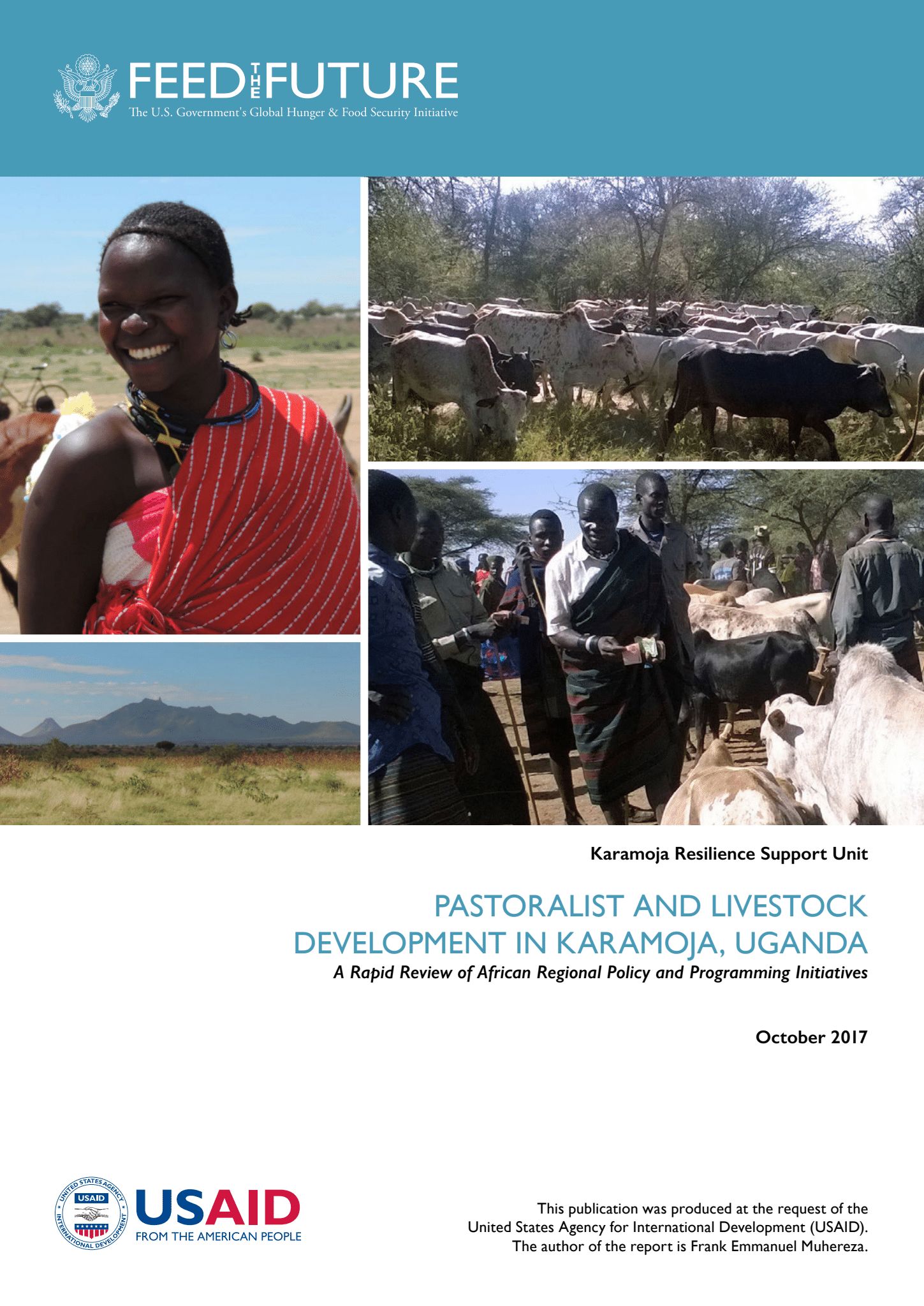
PASTORALIST AND LIVESTOCK DEVELOPMENT IN KARAMOJA, UGANDA
This review examines regional policies and programming initiatives in East Africa and the Horn of Africa related to pastoral areas development, and their relevance to the Karamoja Region of Uganda.
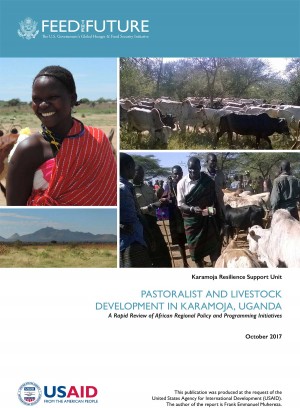
Policy Contexts in Karamoja: Reviewing African Regional Policies on Pastoralism and Livestock
This review examines regional policies and programming initiatives in East Africa and the Horn of Africa related to pastoral areas development, and their relevance to the Karamoja Region of Uganda.
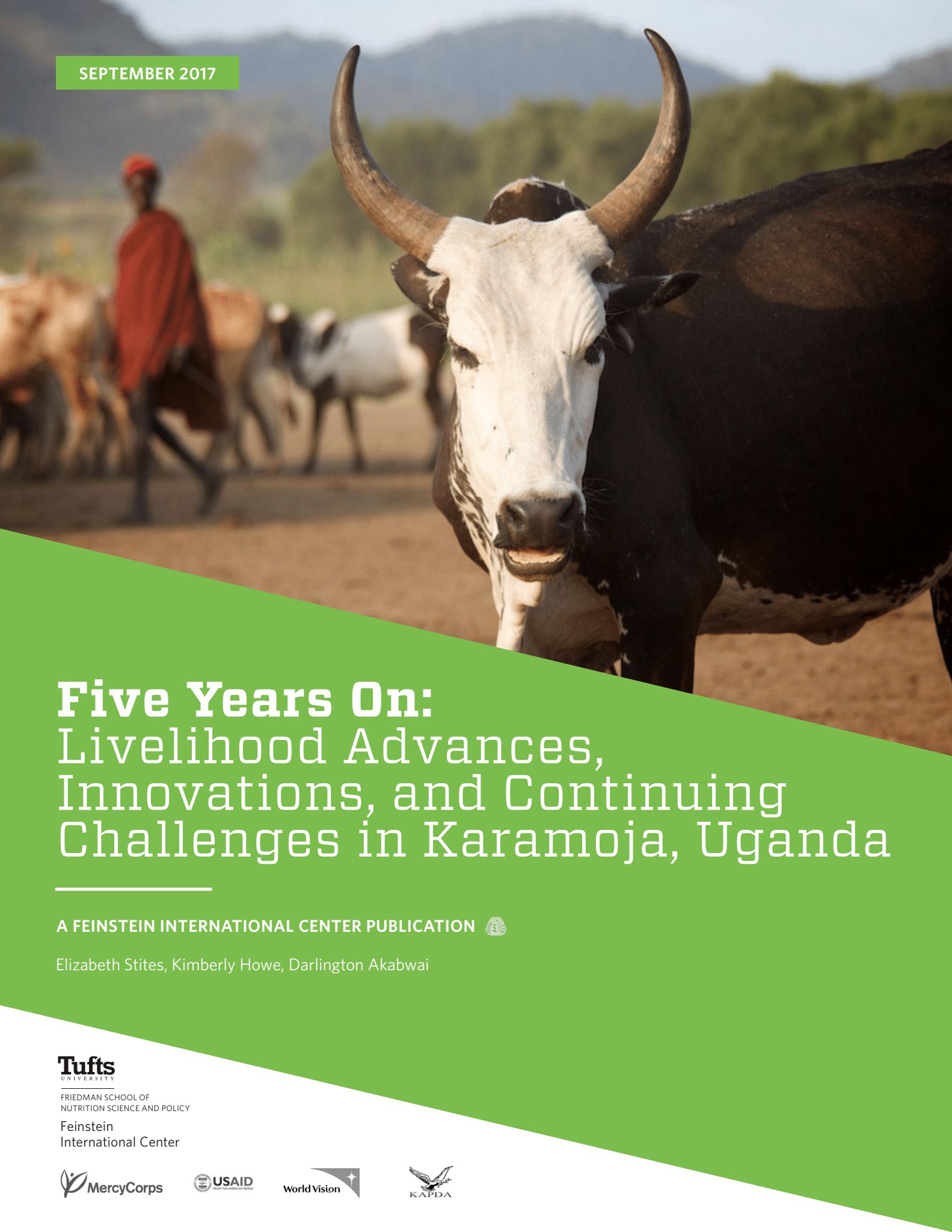
Five Years On: Livelihood Advances, Innovations, and Continuing Challenges in Karamoja, Uganda
A quantitative analysis of a representative group of villages indicates that there has been a widespread increase in the utilization of services as well as improvement to well-being for residents of northern Karamoja since 2013
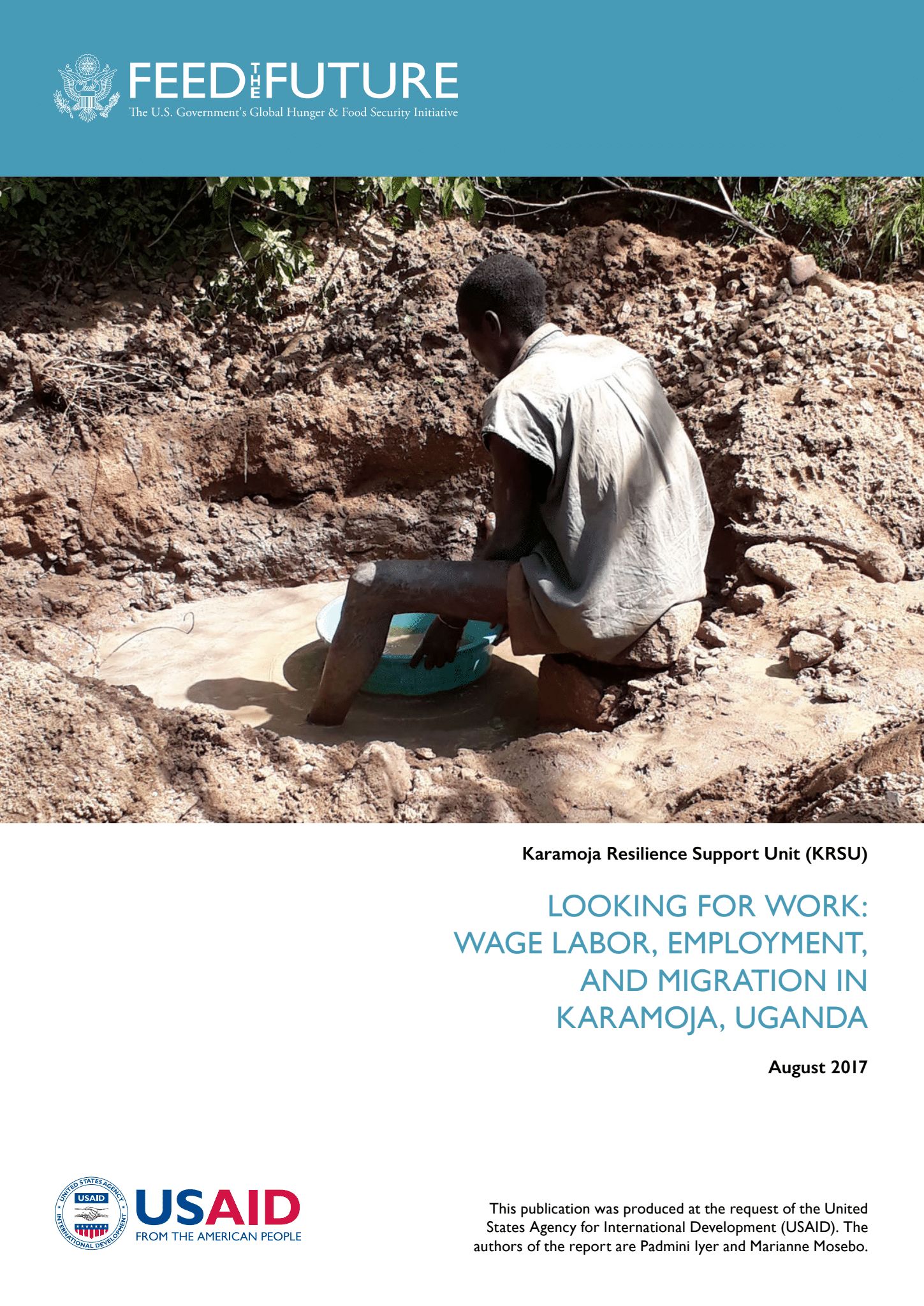
LOOKING FOR WORK: WAGE LABOR, EMPLOYMENT, AND MIGRATION IN KARAMOJA, UGANDA
The main purpose of this assessment is to document and analyze trends in labor and employment in the non-pastoral labor sectors within and outside Karamoja, and to investigate how individual- and macrolevel factors influence participation in the labor market.
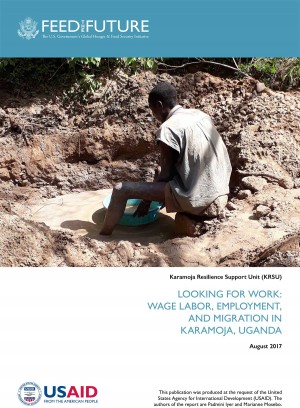
Looking for Work: Wage Labor and Migration in Karamoja
The main purpose of this assessment is to document and analyze trends in labor and employment in the non-pastoral labor sectors within and outside Karamoja, and to investigate how individual- and macrolevel factors influence participation in the labor market.
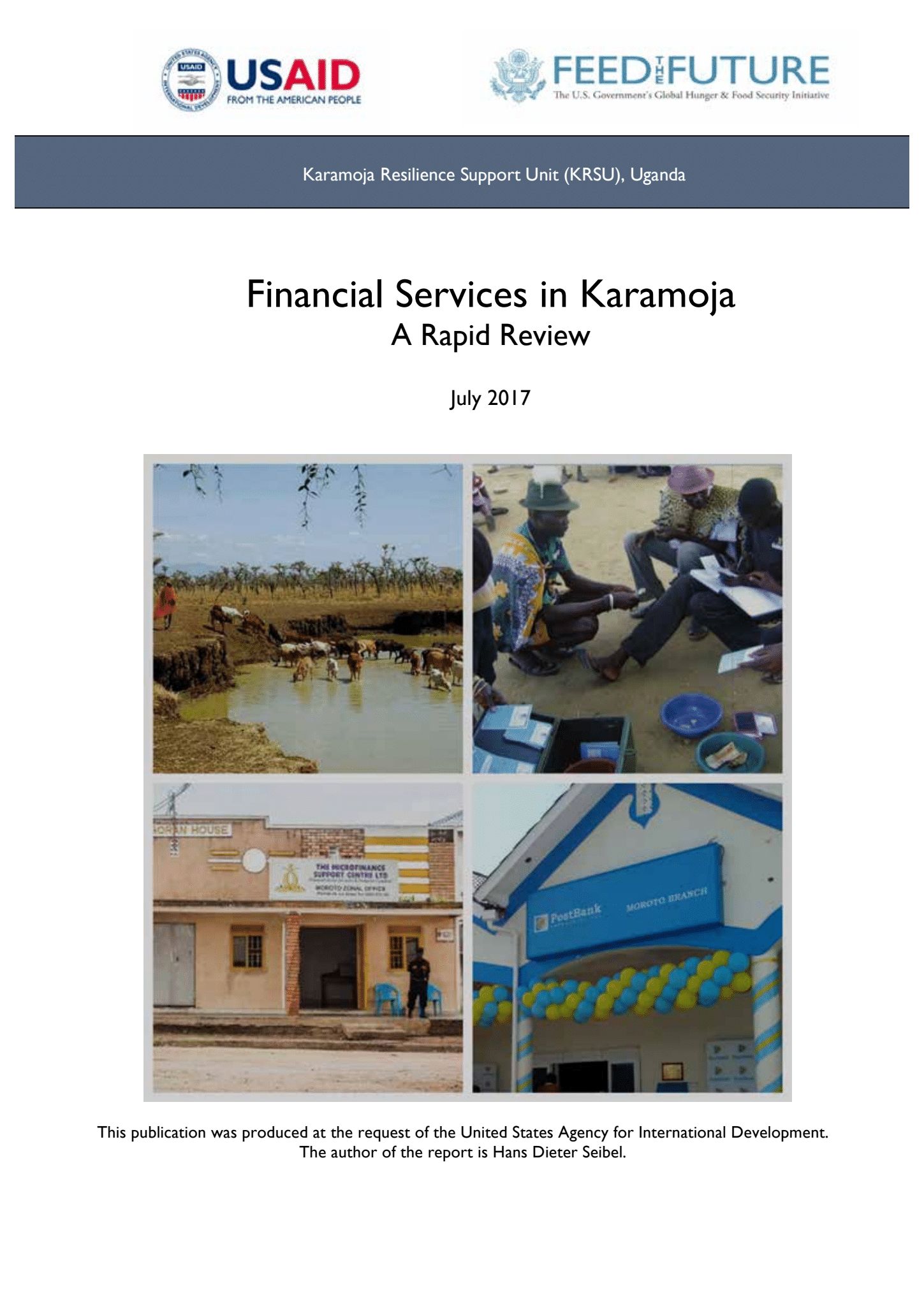
Financial Services in Karamoja A Rapid Review
The review is an initial exploratory and rapid assessment of financial services in the region and was conducted over a short time frame. The aim to flag issues for more detailed analysis and follow up, rather than being a comprehensive study on financial services.
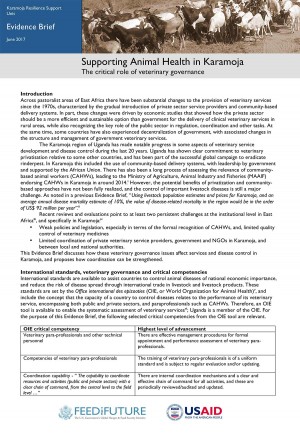
KRSU Veterinary Support Brief
Across pastoralist areas of East Africa there have been substantial changes to the provision of veterinary services since the 1970s, characterized by the gradual introduction of private sector service providers and community-based delivery systems.
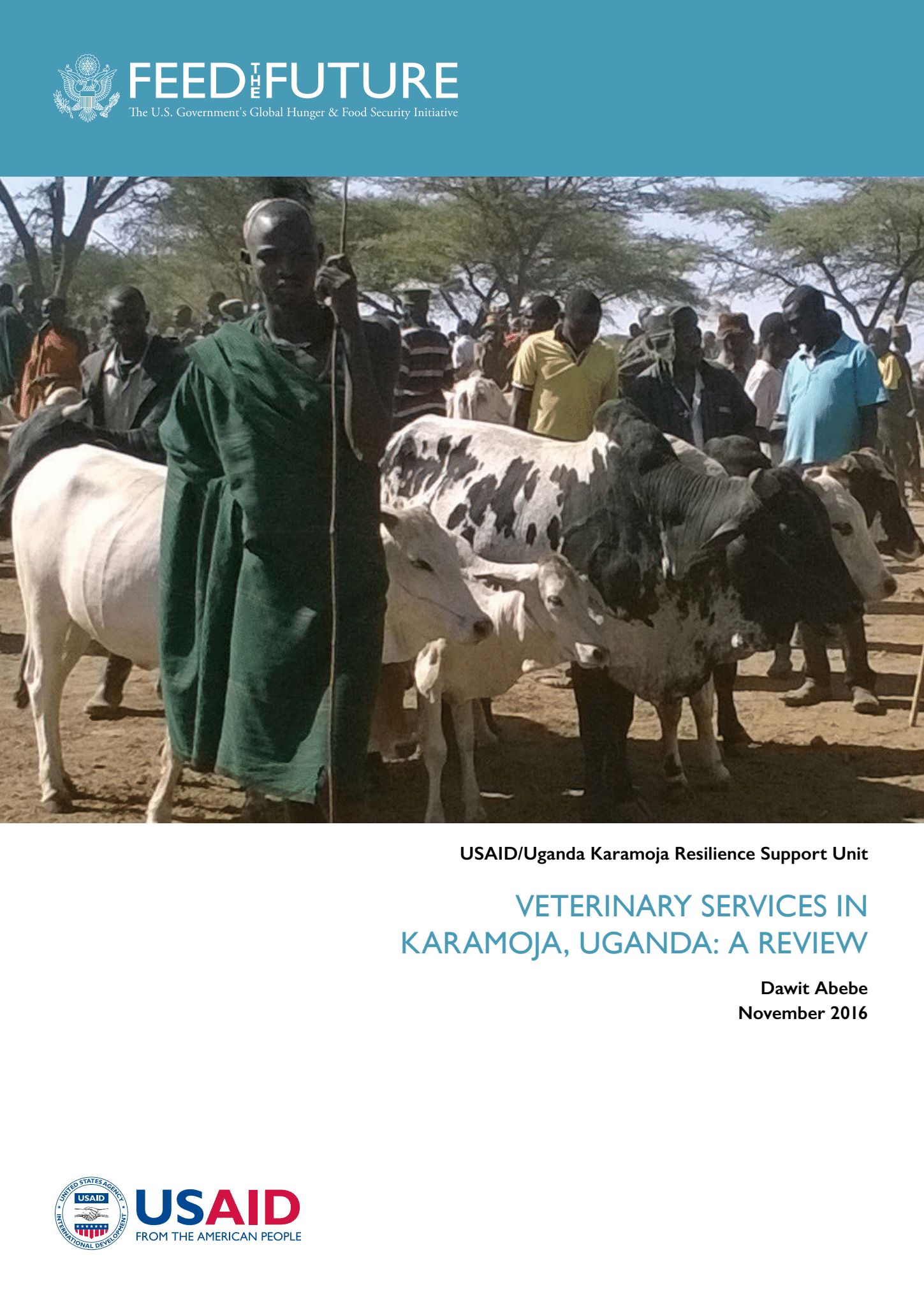
VETERINARY SERVICES IN KARAMOJA, UGANDA: A REVIEW
This aim of this report is to document the experiences of veterinary service delivery in Karamoja and draw lessons to guide a strategy for future service provision, aligned to Uganda’s animal health policies and legislation.
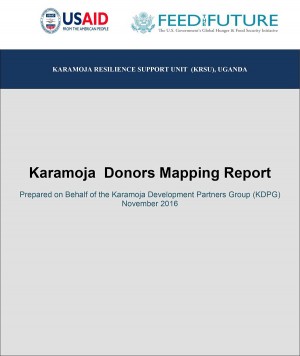
Karamoja Donors Mapping Report
A mapping of 2017 funds to Karamoja from 10 major bilateral and multilateral donors. Additional Information This donor mapping exercise has been compiled by the USAID supported Karamoja Resilience Unit (KRSU), on behalf of the KDPG. This is the second year that the KDPG has produced this mapping exercise. This year it is estimated that these 10 donors will provide €89 million (approx. 380 billion Ugx) during 2017. The analysis provided in this report (see Section 2) demonstrates that this funding is provided across all sectors with a particular focus on the basic service delivery (KIDP strategic objective 1) and food security (KIDP strategic objective 6).
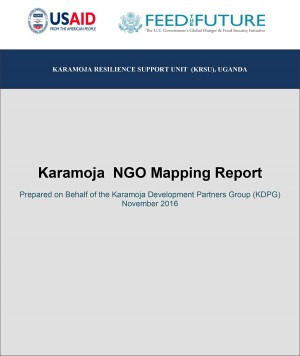
Karamoja NGO Mapping Report
This mapping exercise has been compiled by the USAID supported Karamoja Resilience Support Unit (KRSU), on behalf of the Karamoja Development Partners Group (KDPG). This mapping is based on responses from 54 NGOs (International, National, and Faith Based NGOs) out of a total of 59 organizations identified and contacted, and compiles information collected between June and November 2016. Over time more information will be gathered, and updated maps will be shared with stakeholders.
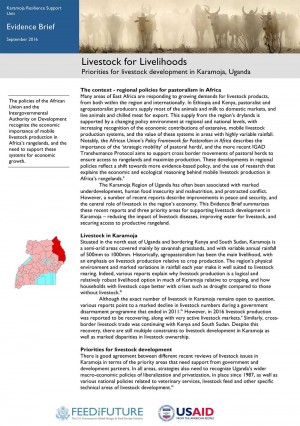
Livestock for Livelihoods- Priorities for livestock development in Karamoja, Uganda
Many areas of East Africa are responding to growing demands for livestock products, from both within the region and internationally. In Ethiopia and Kenya, pastoralist and agropastoralist producers supply most of the animals and milk to domestic markets, and live animals and chilled meat for export. This supply from the region’s drylands is supported by a changing policy environment at regional and national levels, with increasing recognition of the economic contributions of extensive, mobile livestock production systems, and the value of these systems in areas with highly variable rainfall.

Livestock for Livelihoods: Priorities for livestock development in Karamoja, Uganda
An evidence brief on livestock development in Karamoja, Uganda. Recommendations include revitalization of veterinary services is a priority, water development for livestock, and local land use planning by local governments with communities. The African Union’s Policy Framework for Pastoralism in Africa provides an overarching Africa-wide policy to which new policies on range land and pastoralism in Uganda can be aligned, with recognition of the importance of strategic herd mobility.
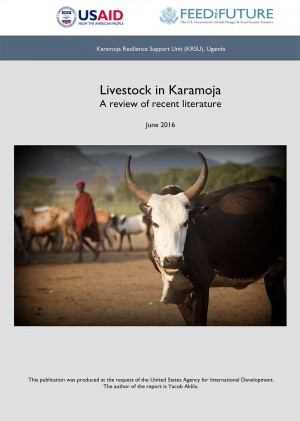
Livestock in Karamoja: A review of recent literature
The review synthesizes the main issues impacting livestock production in the region and identifies critical factors affecting livestock production. This review is drawn largely from the literature produced during the last five years on Karamoja generally, and more specifically on the livestock sector in Karamoja. Additional information was obtained through interviews in Kampala and Moroto with Government and NGO staff in April and May 2016.
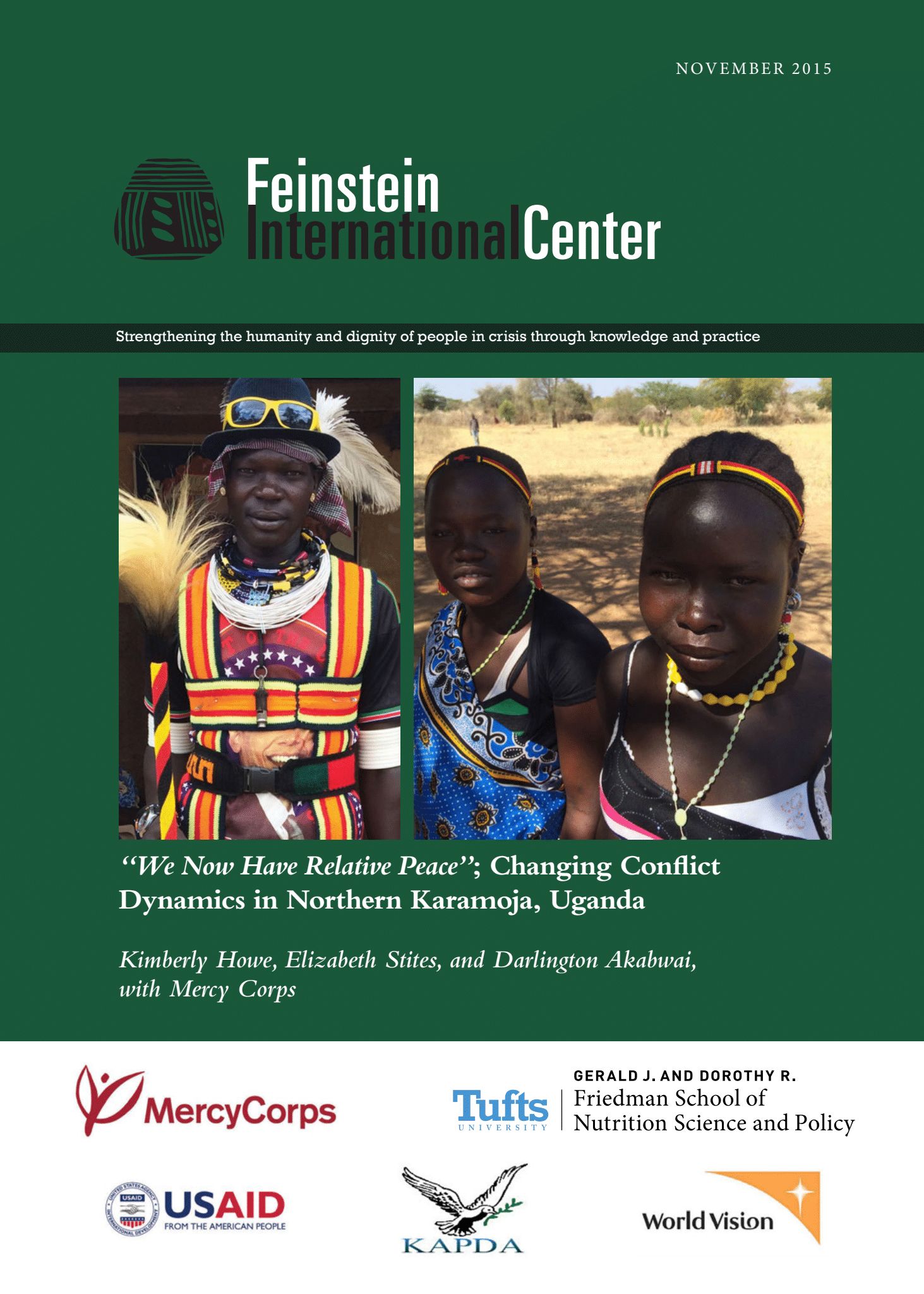
“We Now Have Relative Peace” ; Changing Conflict Dynamics in Northern Karamoja, Uganda
The objective of the study was to provide a nuanced understanding of the current threats to security at the household, community, district and regional levels, and to examine how these dynamics have changed in recent years.
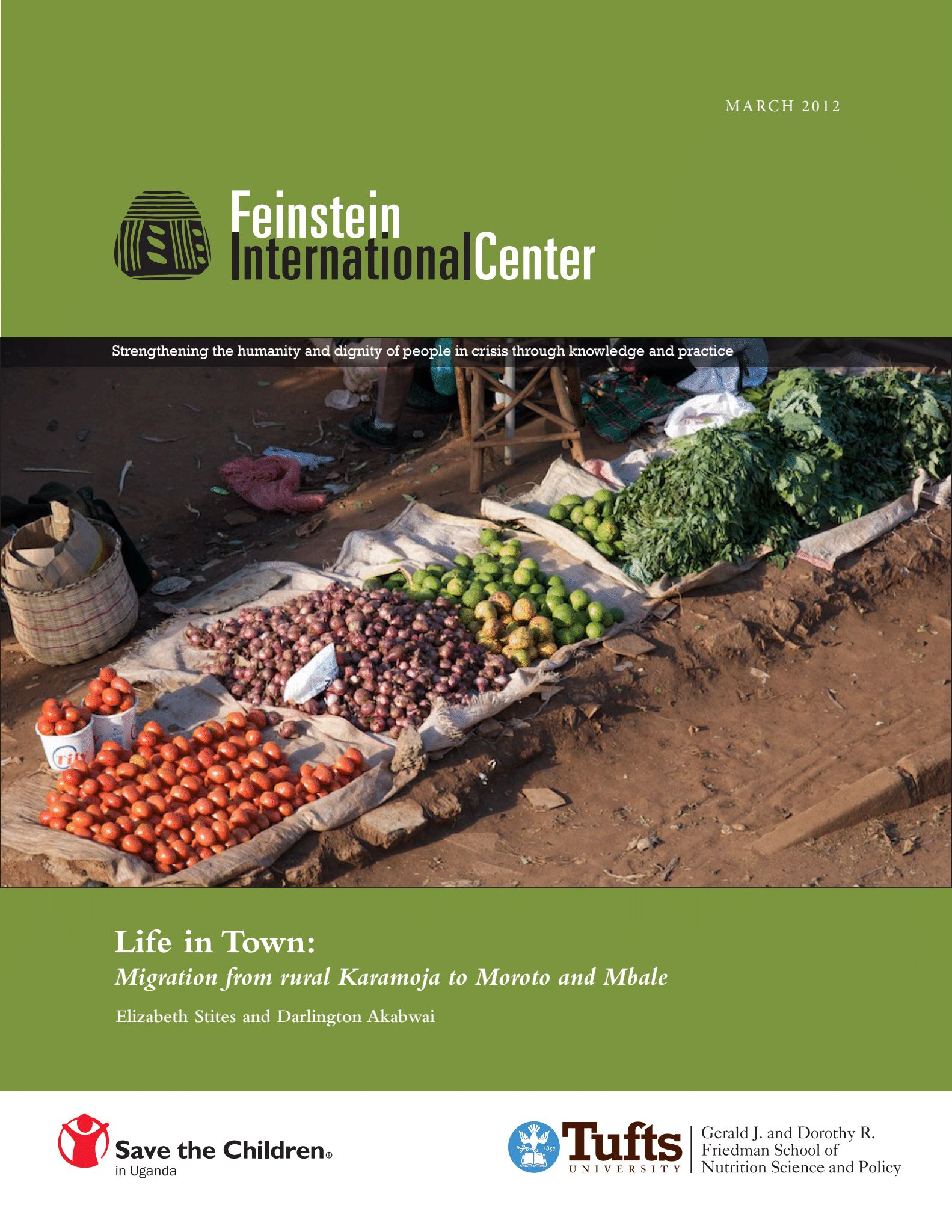
Life in Town: Migration from rural Karamoja to Moroto and Mbale
The phenomenon of out-migration from Karamoja is well known and widely discussed both by rural residents in the region and by officials in receiving cities
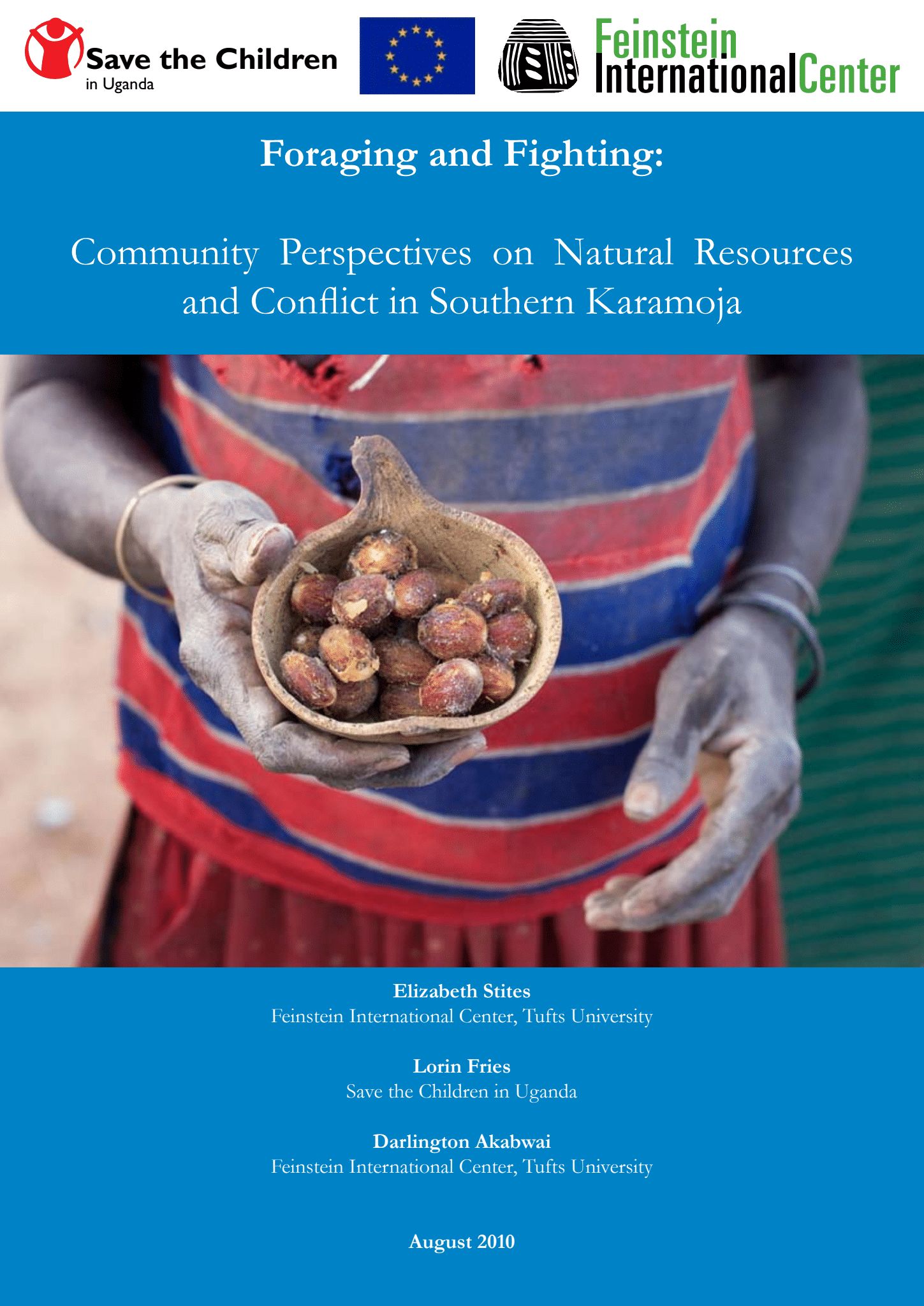
Foraging and Fighting: Community Perspectives on Natural Resources and Conflict in Southern Karamoja
In our research in Karamoja since 2005, respondents often discuss problems with natural resource access and availability, and with comparable frequency they describe conflict with neighboring or nearby groups who are also accessing natural resources.
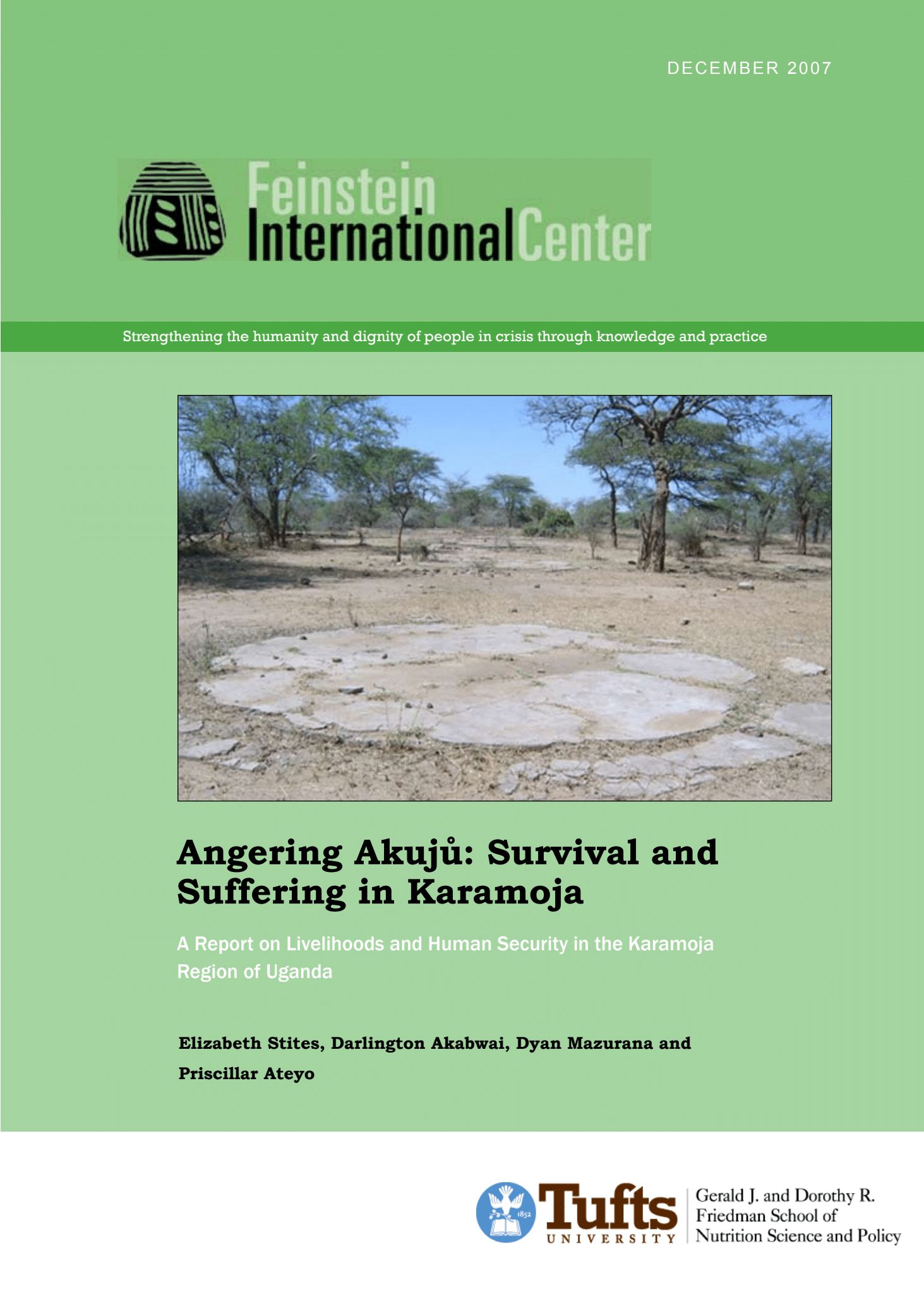
Angering Akujů: Survival and Suffering in Karamoja
A Report on Livelihoods and Human Security in the Karamoja Region of Uganda
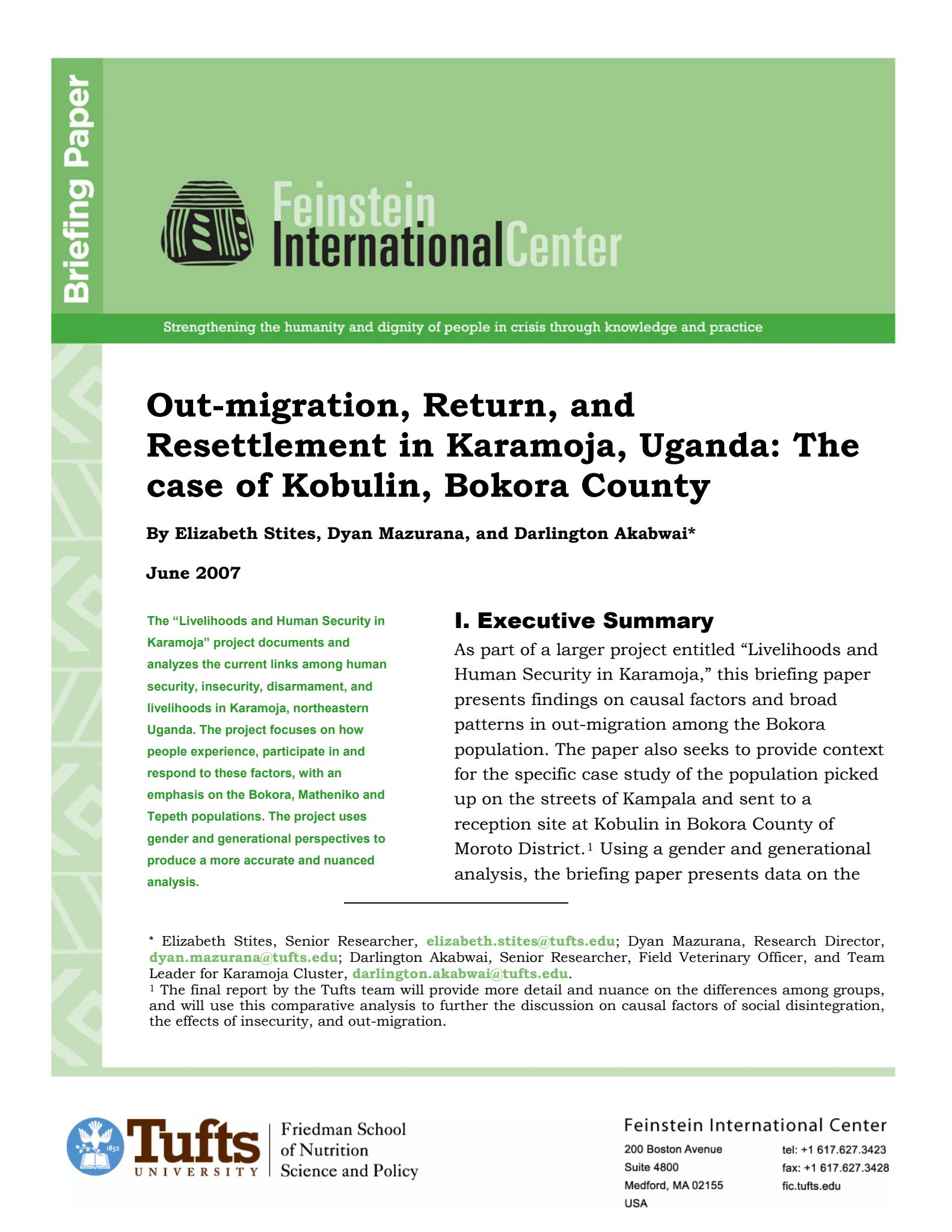
Out-migration, Return, and Resettlement in Karamoja, Uganda: The case of Kobulin, Bokora County
As part of a larger project entitled “Livelihoods and Human Security in Karamoja,” this briefing paper presents findings on causal factors and broad patterns in out-migration among the Bokora population.
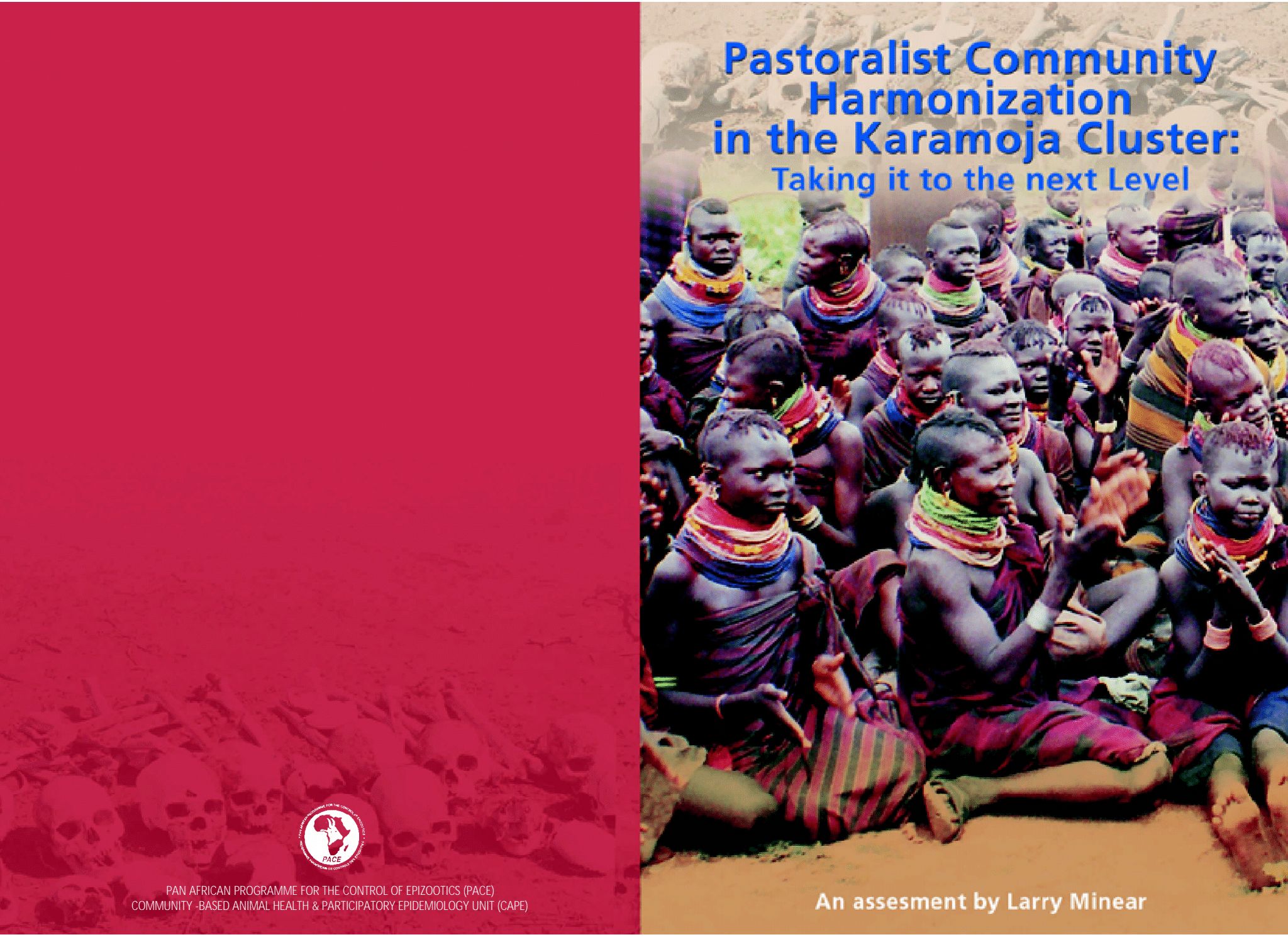
Pastoralist Community Harmonization in the Karamoja Cluster: Taking it to the Next Level
The resulting review gives PCHI high marks for its work on both the animal health and conflict resolution fronts, and in developing synergies between them